
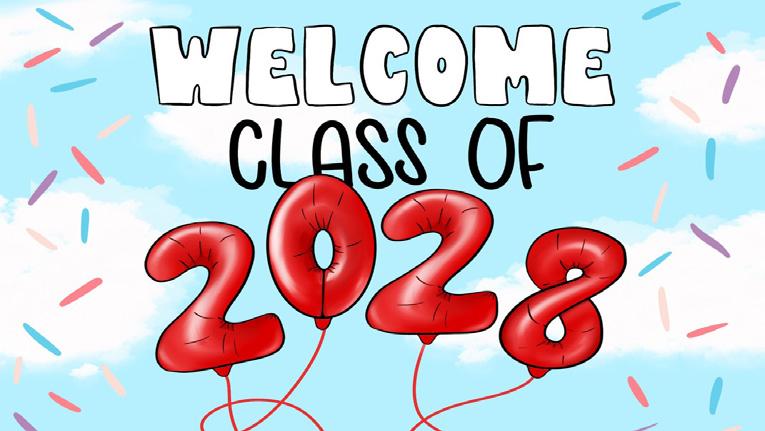
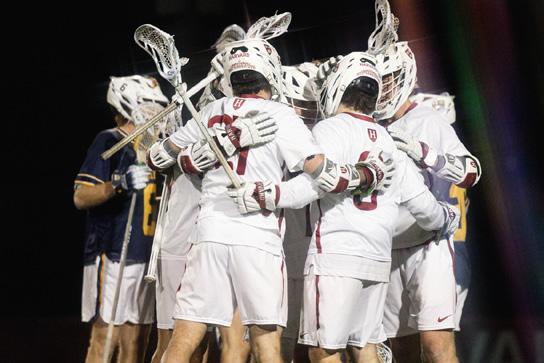

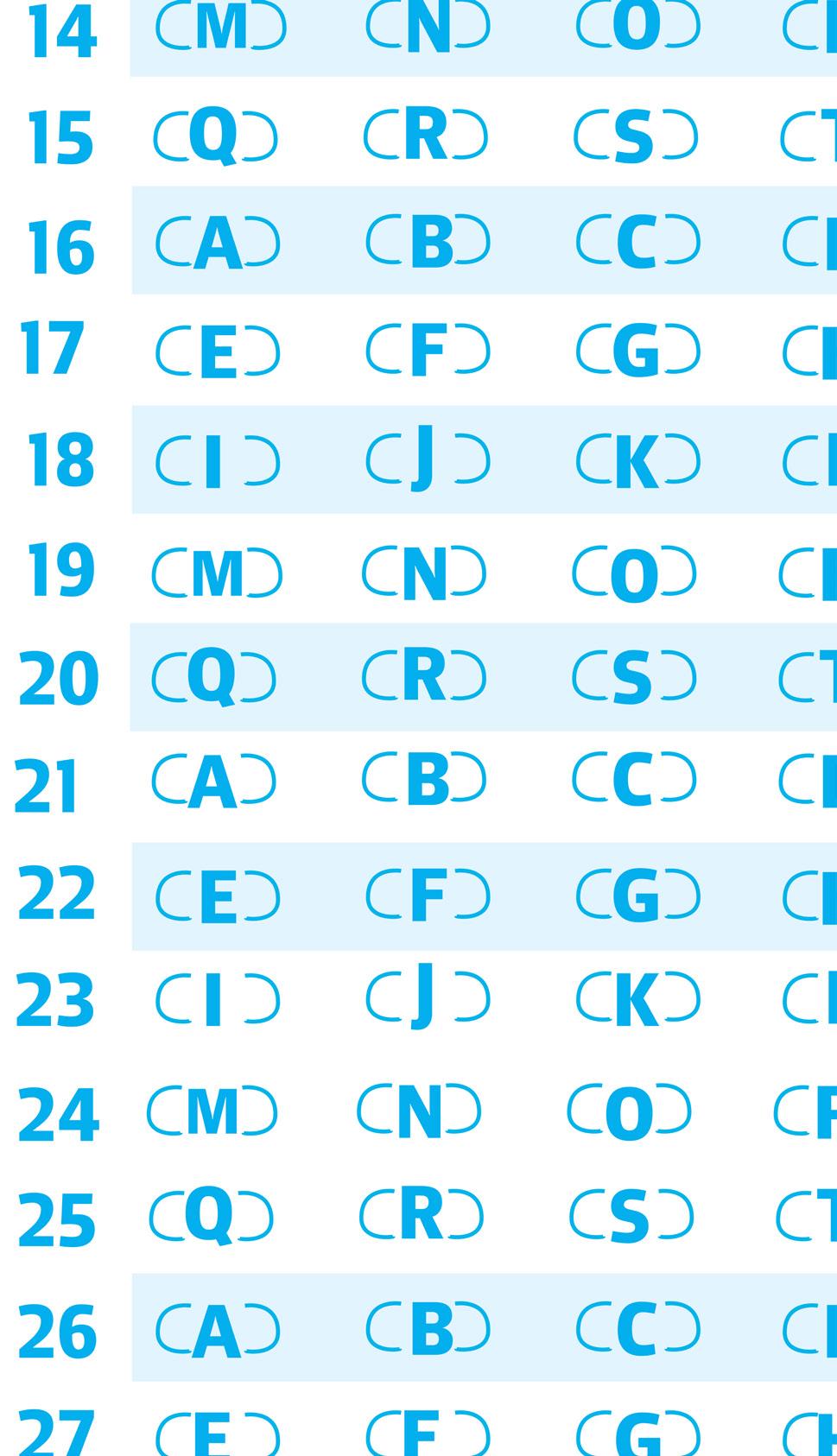


— Tang’s case manager after his initial suicide attempt in April 2015 — to move forward.
The trial, which is taking place at the Middlesex County Superior Court, is expected to last until the end of next week.
Tuesday
During opening arguments on the first day of the trial, Tang’s attorneys told a jury that Northrop was negligent in her care for Tang. But Northrop’s attorneys denied negligence, arguing that she fulfilled her duty of care to Tang. Heinlein delivered the first opening statement, in which he alleged that Northrop knew about Tang’s suicidal ideation but “did nothing.” Heinlein identified three types of students who may be at risk of suicide — students who display warning signs, like prior suicide attempts, and are therefore the easiest to identify; students known to be at-risk but who display no warning signs; and those that are not known to be at-risk and display no warning signs. Heilein said Tang fell into the second category. “Melanie Northrop knew about type 2 kids and Luke was one of them,” Heinlein
said in his opening statement. “Northrop knew that Luke underreported, minimized his feelings, and wanted to rely on his friends and pastor for help.” Tang was admitted to McLean Hospital in Belmont, Mass. for a week-long stay after his initial suicide attempt in April 2015. When the hospital discharged Tang around Apr. 29, 2015, he met with Northrop at Harvard University Health Services.
During that meeting, Tang told Northrop that he planned on going on a week-long retreat on May 17 with friends before spending the summer in China.
According to the suit, Northrop told Tang that he needed to seek out a support plan in China with his therapist and continue his treatment when he returned to
Two months ago, the Harvard Union of Residential Advisors began to unionize — but even as the group has publicly sped through the recognition process, tensions have steadily built within the union.
HURA first publicly launched its unionization push on Feb. 27. The next week, it filed a petition with the NLRB on March 6, and less than two months later, it is gearing up for elections this month.
But privately, several residential advisers — both those in favor of and opposition to the union — have felt friction, noting disconnects between proctors and unions, as well as an overall failure of communication.
‘Taints the Whole Thing’
Abhishek Raman, a proctor in Lionel Hall,
said information gaps have persisted, and “the unionization as a process was not on people’s radar.”
“Having been in this role for close to a decade, I only found out about it by reading an article in The Crimson,” Raman added.
Straus Hall proctor Hasani J. Gunn said the lack of publicity is something “pro-union and anti-union proctors completely agree on.”
“The fact that some folks didn’t learn about this unionizing effort until a Crimson article, and now that they’re implicated in this — that was not good,” he said.
Hansenard D. Piou — a tutor in Quincy House who joined HURA before its public launch — said he “found out through word-of-mouth, and outreach has been similarly just talking to other people about it.” Some advisers also said they have felt intentionally excluded.
College students voted overwhelmingly on Thursday to oust Harvard Undergraduate Association Co-President John S. Cooke ’25 as unspecified misconduct allegations swirled around him.
The effort to recall Cooke succeeded with 88 percent of voters in favor of removing him from office. The 1549-211 vote to recall Cooke vastly outstripped voter turnout for last week’s HUA election, with 305 more students participating in the recall election on Thursday. Cooke wrote in a Friday morning state-
COLLEGE ADMISSIONS THE HARVARD CRIMSON THE UNIVERSITY DAILY, EST. 1873 | VOLUME CLI, NO. 11 | CAMBRIDGE, MASSACHUSETTS | FRIDAY, APRIL 12, 2024 Atrial over a wrongful death lawsuit accusing Harvard Counseling and Mental Health Service employee Melanie G. Northrop of negligence in her care of Luke Z. Tang ’18, an undergraduate who died by suicide in 2015, began Tuesday. David W. Heinlein is the lead attorney representing Tang’s estate, while attorneys William J. Dailey III and Victoria C. Goetz are representing Northop in the trial. The lawsuit, which was filed in September 2018 by Tang’s father Wendall W. Tang, initially accused Harvard and several of its employees — Northrop, Senior Resident Dean Catherine R. Shapiro, and former Lowell House Resident Dean Caitlin M. Casey ’03 — of “negligence and carelessness” in their care for Tang following his initial suicide attempt in April 2015. A court judge dismissed the claims against Harvard, Shapiro, and Casey in December 2022, writing that the parties sufficiently satisfied their duty of care to Tang following his initial suicide attempt in spring 2015. In January 2023, Tang’s family appealed the dismissal. But the judge allowed the charges against Northrop
ment that “serving the student body has been the honor of a lifetime. I remain proud of the work that my team and I have accomplished, and I’m excited to pass the torch to the next slate of leaders.” The symbolic recall effort, which was promoted by the Harvard Feminist Coalition, came nine days before the end of his tenure and after his successors had already been elected last weekend. The vote to remove Cooke reflected the student body’s outrage over the misconduct allegations against him and a determination to hold Cooke accountable for his alleged wrongdoing, even though the time he had left in student government was quickly expiring. Cooke has denied all allegations against him, dismissing them in a Wednesday op-ed as “dirty campaign tricks.” He has not been publicly accused of any specific wrongdoing. It is not clear how Cooke’s recall from office will impact the HUA’s leadership team in the coming days. According to the HUA’s constitution and bylaws, Cooke’s position as HUA co-president will immediately become vacant. The constitution states that after the successful recall of a co-president, HUA officers should appoint an acting co-president until the Election Commission holds Proceedings Begin in First Week of Wrongful Death Trial Over 2015 Undergraduate Suicide SEE PAGE 4 TANG TRIAL LABOR HUA RECALL SEE PAGE 9 SEE PAGE 5 Visitas: 28 Harvard Vocab Words for the Class of 2028 PAGE 8 FLYBY Introducing Harvard’s Values Statement PAGE 10 OPINION SEE PAGE 14 HBS Prof. Gino Faces Plagiarism Allegations UNDER FIRE. Gino faced multiple charges of plagiarism in a Science Magazine analysis. The academic dishonesty allegations are the latest setback for the embattled Harvard Business School professor. SEE PAGE 4 PLAGIARISM UNDER REPAIR. Four libraries in Harvard Yard will face major renovations under a new plan. The project is expected to be completed in time for the University’s 400th anniversary in 2036. SEE PAGE 9 Libraries Face Major Renovations HARVARD YARD Tensions Rise as HURA Union Elections Loom John Cooke ’25 Ousted in HUA Recall Election BY MICHELLE N. AMPONSAH, JOYCE E. KIM, AND WILLIAM C. MAO CRIMSON STAFF WRITERS BY CAM N. SRIVASTAVA AND WILLIAM Y. TAN CRIMSON STAFF WRITERS BY ARAN SONNAD-JOSHI AND SHEEREA X. YU CRIMSON STAFF WRITERS Lacrosse Dominates the Big Green at Home BIG WIN. After a challenging stretch in the middle of the season, the Harvard men’s lacrosse team defeated Dartmouth to secure a win in a game with major playoff implications for the Crimson. SEE PAGE 16 SPORTS ARTS ORIGIN STORY. The first episode of “A Gentleman in Moscow” provides viewers with the backstory to understand the complexities of the show’s main character, Count Rostov, who is played by Ewan McGregor. Review: A Gentleman in Moscow Premiere Harvard Returns To Standardized Testing NON OPTIONAL. After the University announced it would not require applicants to submit test scores through the Class of 2030, Faculty of Arts and Sciences Dean Hopi E. Hoekstra backtracked on Thursday by requiring applicants to the Class of 2029 to submit SAT or ACT socres. The decision could leave some students scrambling just months before applicantions are due. SEE PAGE 7 SAMI E. TURNER — CRIMSON DESIGNER

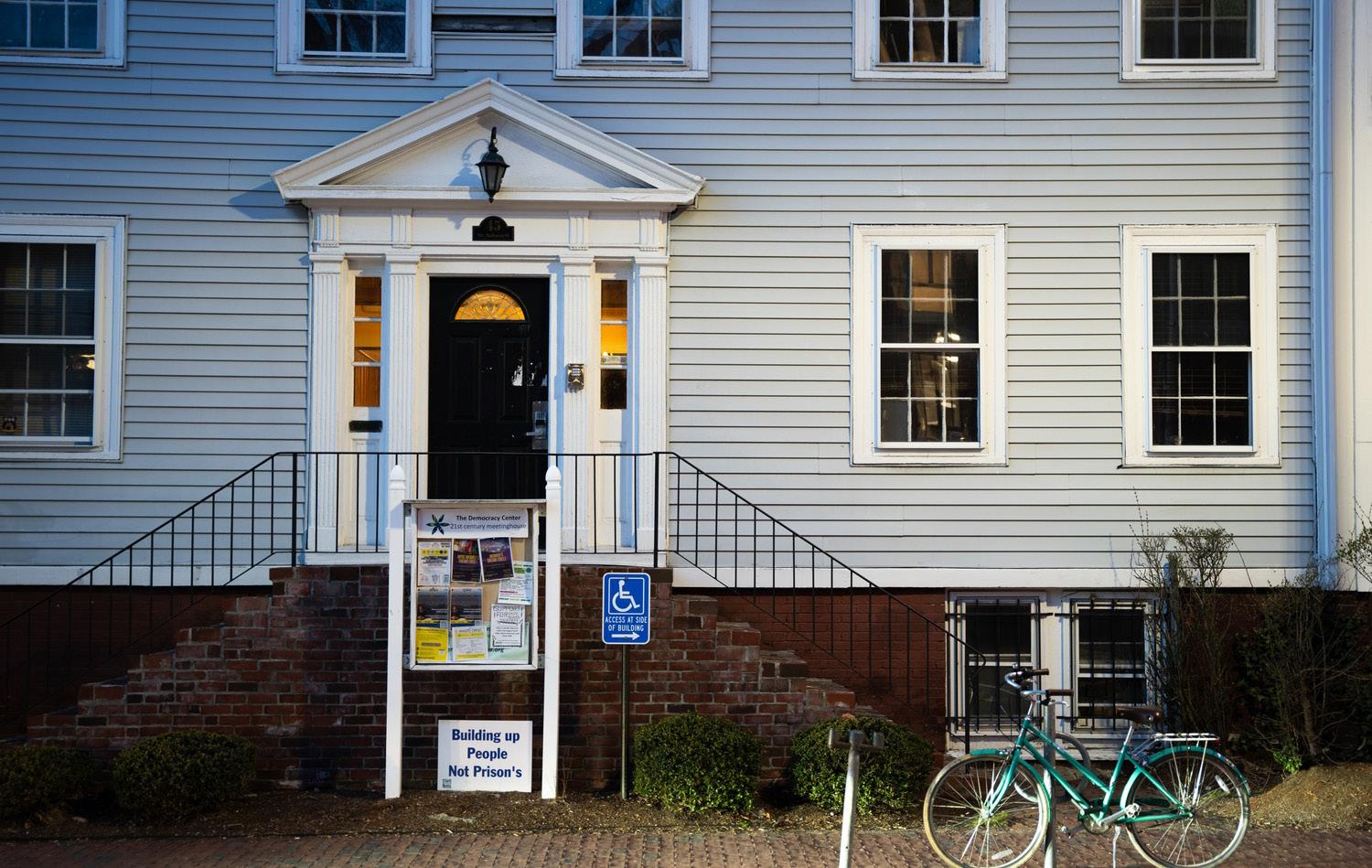
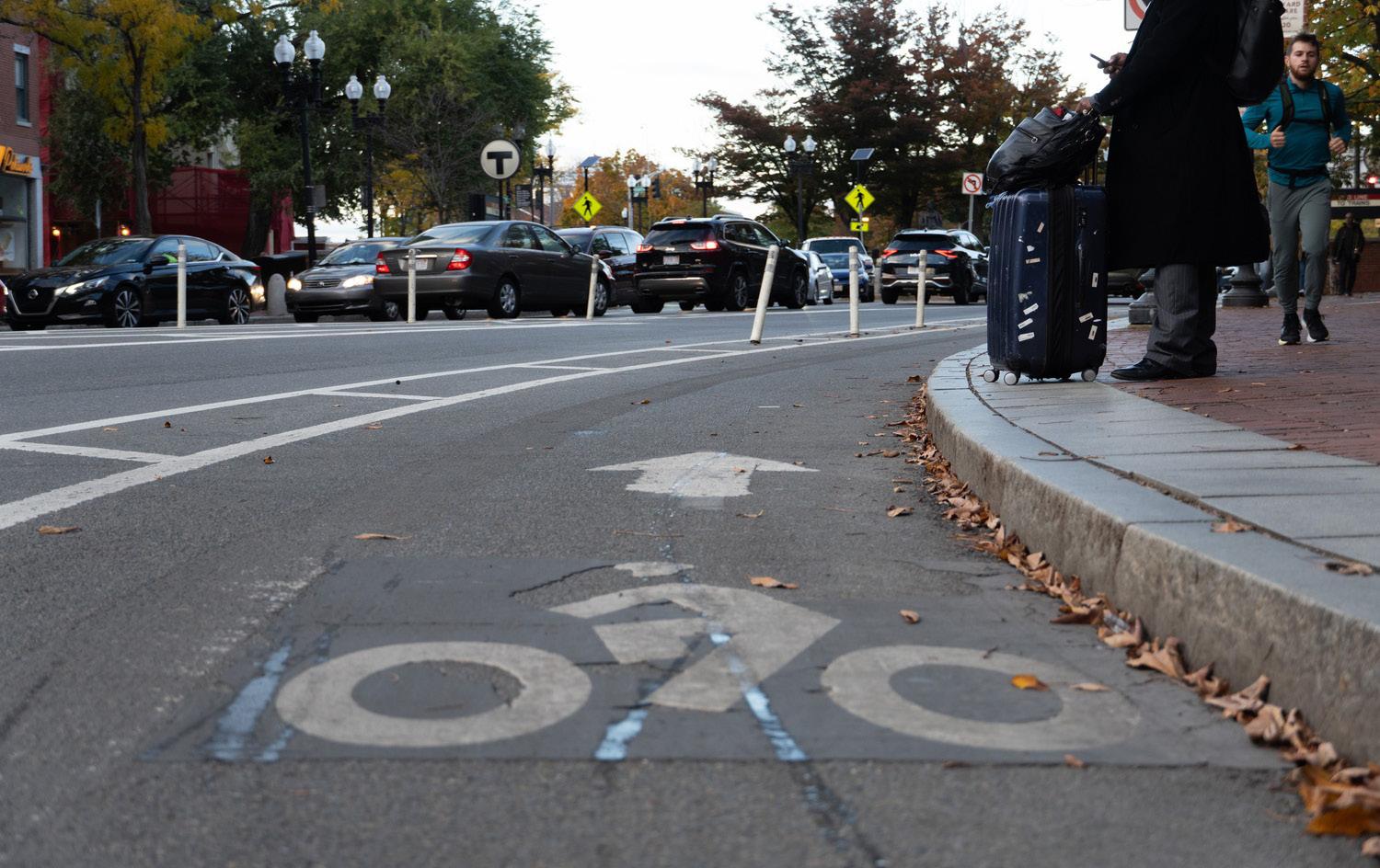

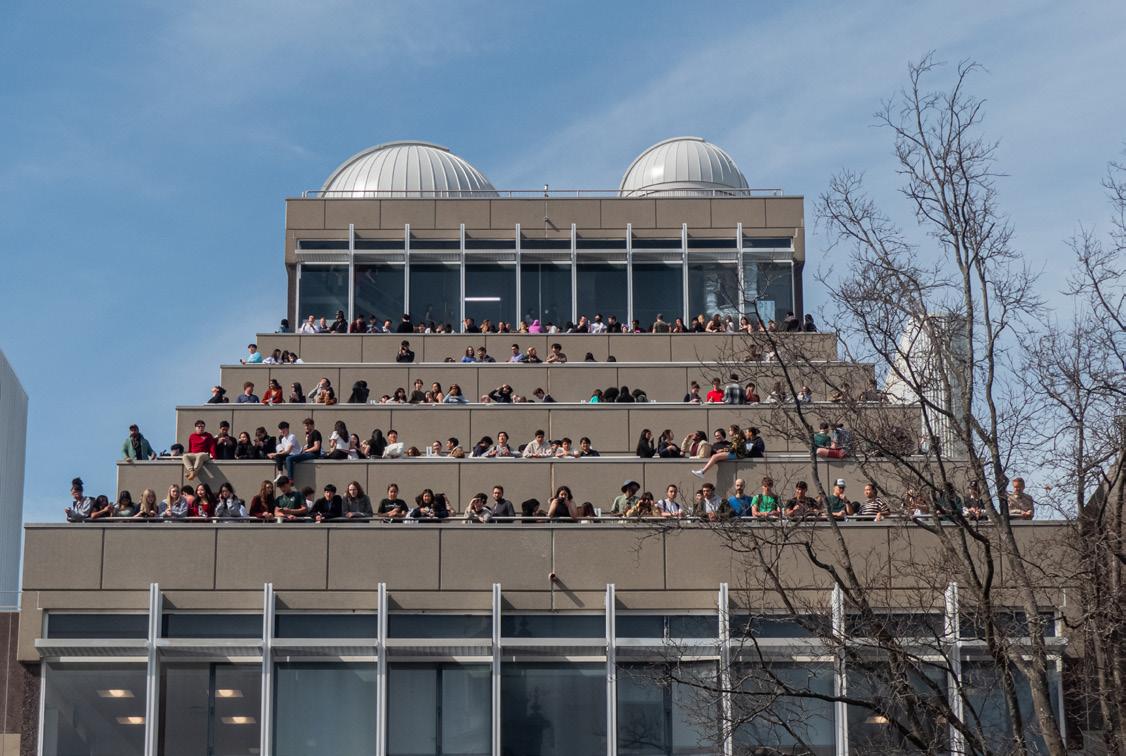
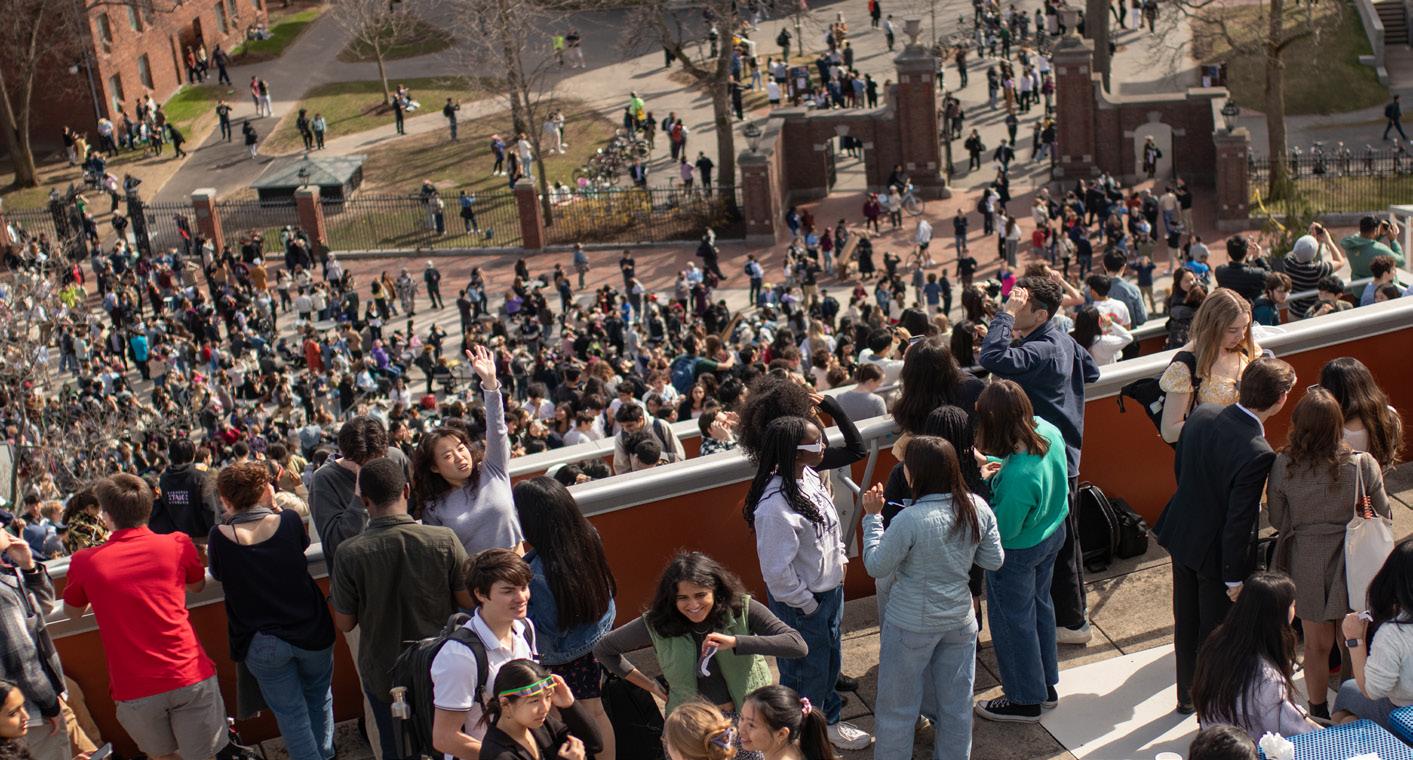
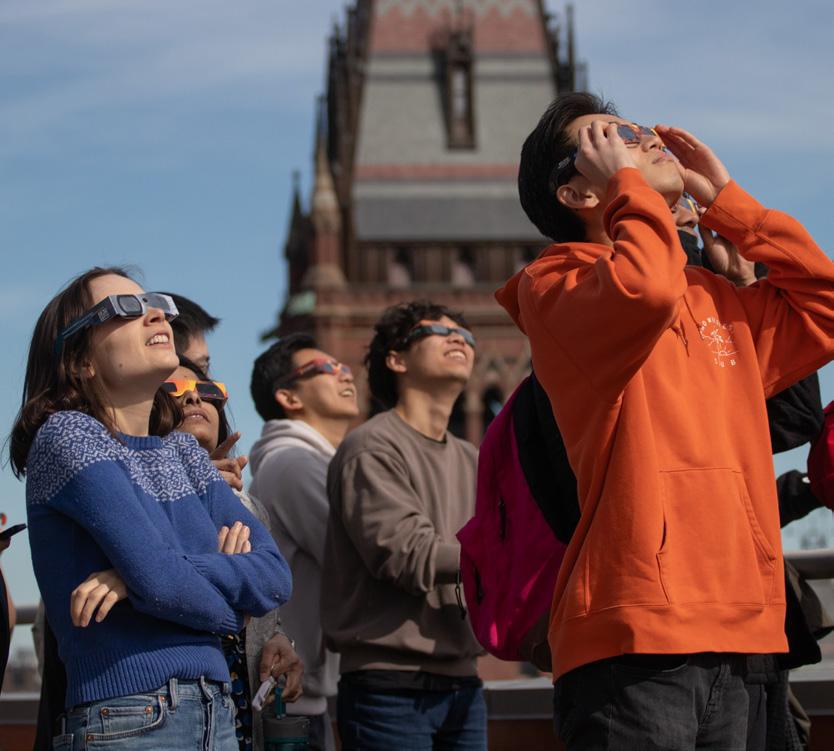
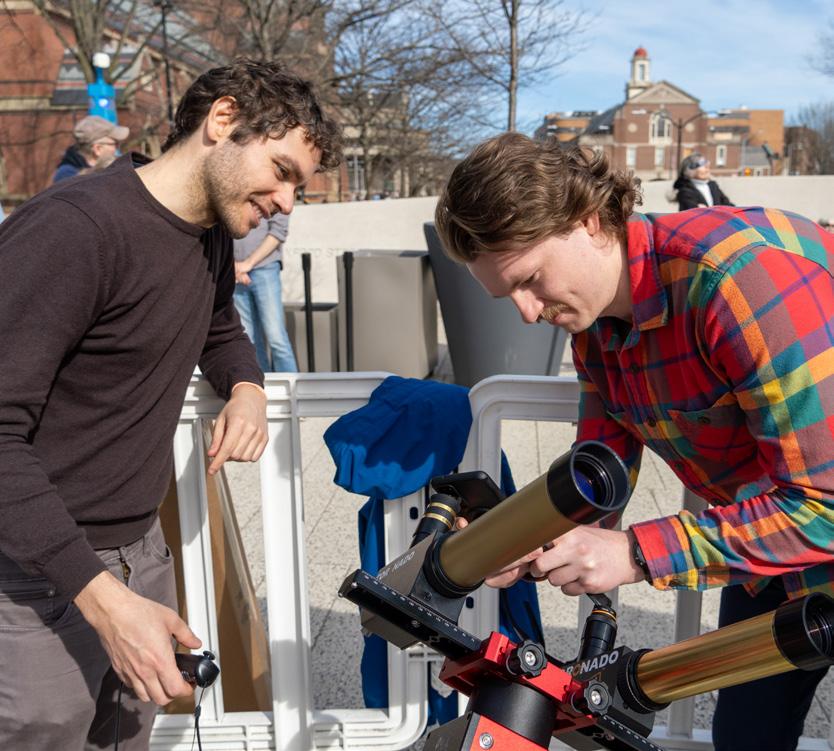


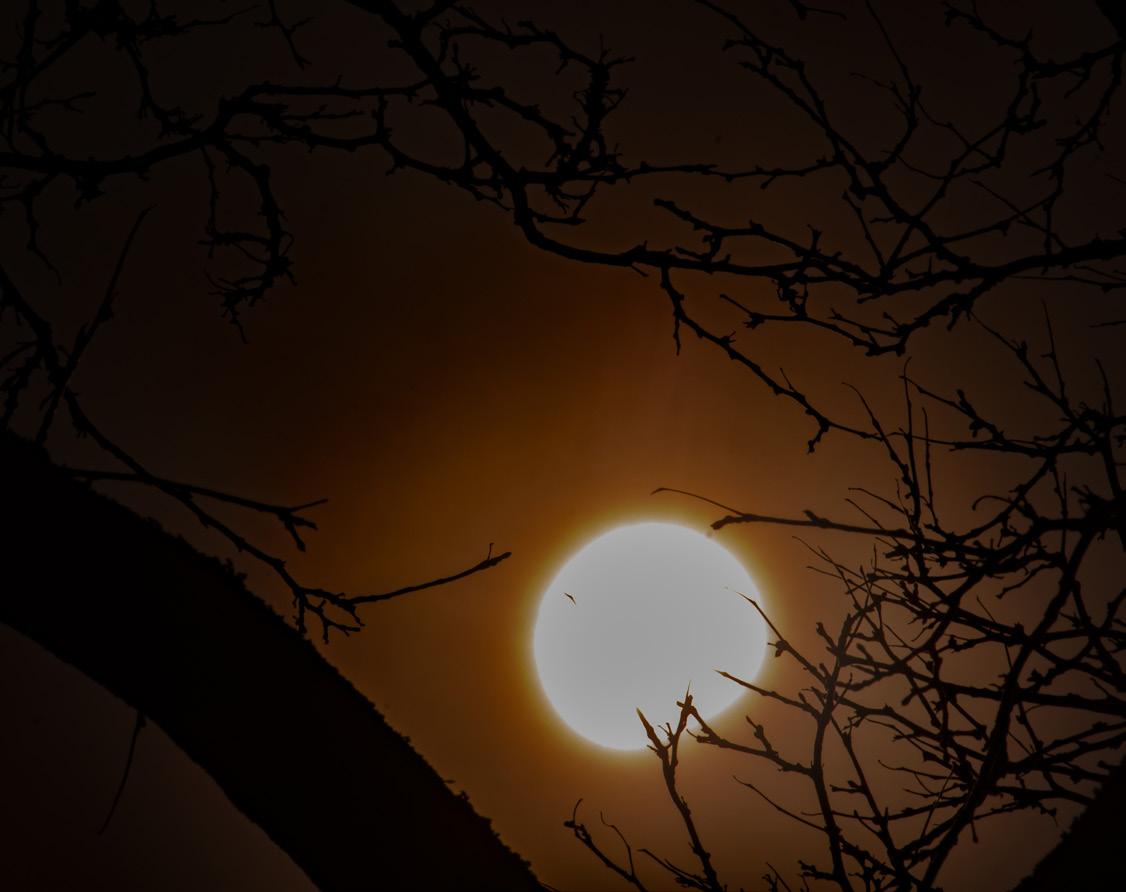
In Photos: Harvard Starstruck by Solar Eclipse The solar eclipse crossed North America over the course of Monday afternoon, with the zone of totality beginning in Mexico and ending in Canada. IKE J. PARK — CONTRIBUTING PHOTOGRAPHER NEAR TOTALITY Harvard affiliates across campus stepped outside Monday afternoon to witness a near-total solar eclipse — the first visible from North America since 2017. The next total solar eclipse to pass through the continent will not occur until 2044. BY CRIMSON MULTIMEDIA STAFF Students take a break from the classroom and gather on the balconies of the Science Center to witness the celestial event. BRIANA HOWARD PAGÁN — CRIMSON PHOTOGRAPHER The Physics, Astronomy, and Earth and Planetary Science departments, in collaboration with the Student Astronomers at Harvard-Radcliffe, organized a watch party in the Science Center Plaza. FRANK S. ZHOU — CRIMSON PHOTOGRAPHER LAST WEEK 2 APRIL 12, 2024 THE HARVARD CRIMSON Proposal to Delay Bike Lanes Slammed Democracy Center to Close HUA Co-President Breaks Silence BIKE LANES METRO STUDENT GOVERNMENT FIERY DEBATES. The longstanding debate over bike lanes in Cambridge reignited Monday evening, as Cambridge residents lashed out against a proposal to extend the deadline to finish a citywide bike lane network by more than a year during a City Council meeting. Under the city’s amended Cycling Safety Ordinance, Cambridge has to construct approximately 25 miles of separated bike lanes spanning the city. Though the original deadline to finish the network was May 1, 2026, just more than 13 miles have been completed, with nearly two more under construction. BY AVANI B. RAI — CRIMSON STAFF WRITER, ELIAS J. SCHISGALL — CRIMSON PHOTOGRAPHER PROGRESSIVE HAVEN. The Foundation for Civic Leadership voted last week to close The Democracy Center for renovations, leaving dozens of progressive Cambridge organizations scrambling for a new meeting space. The Center has served as a meeting place for nonprofit organizations and activists for over two decades — and a party venue for Harvard student organizations. The FCL, which financially supports the center, announced its decision to close the space in a statement to affiliates early last week, citing a need for “necessary renovations.” BY SALLY E. EDWARDS AND ASHER J. MONTGOMERY — CRIMSON STAFF WRITERS, FRANK S. ZHOU — CRIMSON PHOTOGRAPHER RECALL VOTE. Hours before students will vote in a referendum to recall embattled Harvard Undergraduate Association Co-President John S. Cooke ’25, the Harvard junior rejected the misconduct allegations against him in his first public statement in two weeks. Cooke broke his silence with an op-ed published in The Crimson on Wednesday, dismissing the misconduct allegations against him as “dirty campaign tricks” and urging students to vote against the recall effort. BY CAM N. SRIVASTAVA AND WILLIAM Y. TAN — CRIMSON STAFF WRITERS, PHOTO BY ADDISON Y. LIU — CRIMSON STAFF PHOTOGRAPHER AROUND THE IVIES Justin Gaffney Samuels filed a lawsuit against Cornell Tech alleging that the admissions policy of their Break Through Tech program illegally discriminates against men, The Cornell Daily Sun reported Monday. The program is geared toward assisting women and non-binary undergraduate students in pursuing pathways to careers in technology. Samuels claimed that the policy violates Title VII of the Civil Rights Act . THE CORNELL DAILY SUN Paul Sniegowski is departing as Penn’s dean of the College of Arts and Sciences to become the president of Earlham College, The Daily Pennsylvanian reported on Wednesday. Sniegowski guided the College through the Covid-19 pandemic and created Penn’s First-Generation, Low-Income Dean’s Advisory Board. The Dean of the School of Arts and Sciences Steven Fluharty said that the search for a replacement will begin “immediately.” THE DAILY PENNSYLVANIAN The U.S. Department of Education began an investigation into antisemitism at Princeton on April 3, the Daily Princetonian reported Monday. Zachary Marschall, the editor-in-chief of the conservative news website Campus Reform, lodged a complaint, citing chants at an October pro-Palestine walkout. Marschall has filed numerous complaints against multiple universities, including Brown and Northwestern, prompting more than a dozen Title VI investigations. THE DAILY PRINCETONIAN U.S. Surgeon General Vivek Murthy ’98 will be giving Yale’s 2024 Class Day Address, the Yale Daily News reported Thursday. Murthy, who holds an MD and MBA from Yale, will address the graduating class at Yale on May 19. “As a proud Yale alumnus, and as the spouse of an equally proud Yale College alum, it is truly an honor to join Yale’s graduates on Class Day this year,” Murthy wrote to the YDN. THE YALE DAILY NEWS A Brown Students for Israel event featuring an Israeli Defense Forces officer was protested by approximately 60 students from the student groups Jews for Ceasefire Now and Students for Justice in Palestine. The students held posters with the names of Palestinians killed in the conflict. “We are profoundly disappointed that students decided to demonize and mischaracterize his story, instead of taking the time to listen to it,” the BSI president said to the Herald. BROWN DAILY HERALD LAWSUIT AGAINST CORNELL TECH CLAIMS DIVERSITY PROGRAM UNFAIRLY DISCRIMINATED COLLEGE OF ARTS AND SCIENCES DEAN TO LEAVE PENN FOR EARLHAM COLLEGE PRESIDENCY PRINCETON UNDER FEDERAL INVESTIGATION FOR ANTISEMITISM COMPLAINT SURGEON GENERAL VIVEK MURTHY TO GIVE 2024 CLASS DAY ADDRESS STUDENTS GATHER OUTSIDE HILLEL IN PROTEST OF ISRAELI OFFICER’S VISIT Activities set up around the Science Center Plaza included LightSound eclipse sonification and pinhole camera creation. FRANK S. ZHOU — CRIMSON PHOTOGRAPHER Eclipse watchers look through a telescope at the sun. Though outside of the path of totality, Cambridge saw more than 93 percent coverage of the sun. BARBARA A. SHEEHAN — CONTRIBUTING PHOTOGRAPHER From left to right: freshmen Mirika J. Jambudi ’27, Isabella C. Gidi ’27, and Katherine L. Byunn-Rieder ’27 watch the eclipse through solar glasses. BARBARA A. SHEEHAN — CONTRIBUTING PHOTOGRAPHER Students sprawl across the banks of the Charles River, soaking in the warm weather. On nearby Weeks Bridge, the Dean of Students Office hosts a watch party for students. DANIEL MORALES ROSALES— CRIMSON PHOTOGRAPHER The eclipse lasted for two hours and 23 minutes in Cambridge, with peak coverage occurring at 3:29 p.m. DANIEL MORALES ROSALES — CRIMSON PHOTOGRAPHER
The European Parliament approved major reforms to migration law after 10 rounds of votes Wednesday. The reforms would mean all EU member states would share the burden in managing asylum requests or contribute financial assistance to a support fund. The package also includes building new border detainment centers, which would quickly process asylum seekers for eligibility and deport those that do not qualify. Over 160 rights groups criticized the reforms, which they said would weaken human rights, according to the Guardian. APPEALS COURT REJECTS TRUMP’S LATEST EFFORT TO DELAY HUSH MONEY TRIAL
A New York appeals court denied a third attempt by Donald Trumps’ lawyers to delay his criminal trial next week, according to the Washington Post. Trump has been charged with 34 counts of falsifying business records to cover up hush money payments made to porn star Stormy Daniels. Trump’s lawyers have pushed for New York Supreme Court Justice Juan Merchan, the judge overseeing the Manhattan case, to recuse himself, which Merchan has refused to do. This is one of several legal battles for Trump.
ARIZONA SUPREME COURT REINSTATES 1864 ABORTION BAN
The Arizona Supreme Court ruled Tuesday that the state could enforce an 1864 abortion ban, which makes no exceptions for rape or incest and only allows abortions if the mother’s life is at risk. Republicans rejected efforts to repeal the ban Wednesday, according to the New York Times. The Court’s 4-2 decision overruled an earlier decision which allowed abortions up to 15 weeks. The ban solidifies the importance of abortion rights as a major issue for the November elections.
ISRAELI AIRSTRIKE
KILLS SONS OF HAMAS LEADER
An Israeli airstrike in Gaza killed three sons of Hamas leader Ismail Haniyeh. Hamas said four of Haniyeh’s grandchildren were also killed in the strike, but the Israeli military did not confirm the deaths. The strike came as Hamas, Israel, the U.S. and Arab leaders continued peace talks in Cairo after six months of war in Gaza, the New York Times reported Wednesday.
ECUADOR’S FORMER VP GOES ON HUNGER STRIKE
after he was arrested in Mexico’s embassy in Quito. Mexico strongly condemned the forceful entry into its embassy as a “flagrant violation of international law” and has cut diplomatic ties with Ecuador, according to CNN. Ecuador has also met widespread backlash from other Latin American countries over the incident.
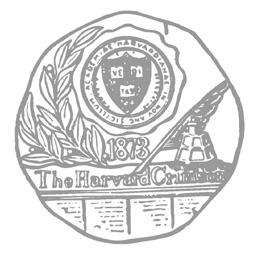
NEXT WEEK 3
What’s Next
Start every week with a preview of what’s on the agenda around Harvard University
Friday 4/12
FOOD 4 THOUGHT FESTIVAL, OFFICIAL LAUNCH & KEYNOTE
Science Center Hall B. 12:00 p.m.
Come see Dr. David Kaplan from Tufts and Harvard’s Dr. Sparsha Saha at the official launch and keynote speech of Food 4 Thought. Food 4 Thought 2024 is a pioneering festival where students from across the world convene to discuss the future of global food.
Saturday 4/13
HARVARD UNIVERSITY WOMEN’S TENNIS VS CORNELL UNIVERSITY
Murr Center, 1:00 p.m.
Harvard’s Women’s tennis team will be competing against Cornell on Saturday. The team, 16-2 overall, sits atop the Ivy League with a 2-0 record among the Ivies. Should Harvard win, it would extend their program record of consecutive wins to 13.
Sunday 4/14
PICASSO: WAR, COMBAT, AND REVOLUTION
Harvard Art Museums, all day The Harvard Art Museums is hosting a free exhibition on Pablo Picasso’s works on war, combat, and revolution. The installment will explore Guernica’s core themes, as well as spanish dictator Francisco Franco and broader imagery around death, good, and evil.
Monday 4/15
HUM SAB UK (WE ARE ONE)EXHIBITION OPENING
CGIS South, Tsai Auditorium (S010), 6:00 p.m.
Enjoy the launch of a multimedia exhibition inspired by women working in the poor, informal sector of India during the public health crisis of Covid-19. The showcase is based on research around the pandemic done by the Self Employed Women’s Association.
Tuesday 4/16
SASHA’S BIRTHDAY PAW-TY!
Science Center Plaza, 12:00 p.m.
Campus celebrity and “Community Engagement
Dog” Sasha is having her birthday party! The celebration will include games and snacks, and joyful celebrations with people from across Harvard’s campus.

Wednesday 4/17
COURSE REGISTRATION FOR FALL 2024 DEADLINE.
Wednesday is the deadline for course registration for Fall 2024.
Thursday 4/18
EARTH DAY CELEBRATION
Science Center Plaza, 12:00-2:00 p.m.
The Harvard Office of Sustainability and Harvard Common Spaces will be holding an Earth Day Festival on Thursday. Students can recycle their electronics, shop and donate at a “Freecycle,” and have your bike “checked up” all in an effort to celebrate the earth.
Friday 4/19
ASIAN AMERICAN DANCE TROUPE
8pm Friday Loeb Center Join the Asian American Dance Troupe at their 2024 Eastbound show. The group will perform a mix of hip-hop, open-style, contemporary, and traditional dance pieces, showcasing a variety of cultural and dance backgrounds. The show will also feature special guests, including the Traditional Tibetan-Classical Fusion.
STEPPING INTO SPRING
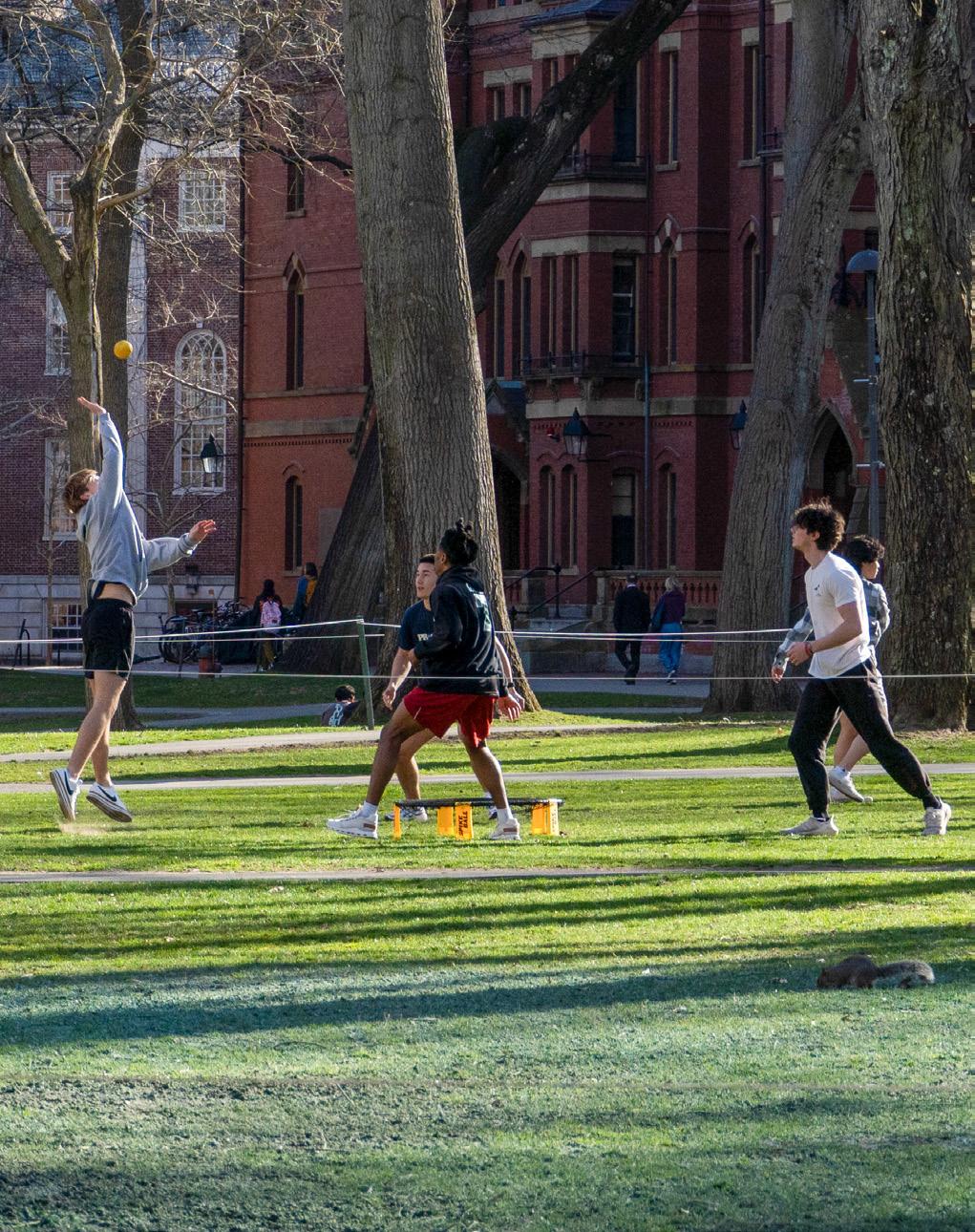
Be sure to email your adviser to get the advising hold lifted, and scour the Q guide for hidden gems. Then, sit back and get ready for the Crimson Cart to open for Spring 2026. IN THE REAL WORLD Ecuador’s
former Vice President Jorge Glas went on hunger strike Wednesday, four days
EUROPEAN
APPROVES
APRIL 12, 2024 THE HARVARD
PARLIAMENT
MIGRATION REFORMS
CRIMSON
BARBARA A. SHEEHAN — CONTRIBUTING PHOTOGRAPHER STAFF FOR THIS ISSUE Night Editors Ryan H. Doan-Nguyen ’25 Sophia C. Scott ’25 Assistant Night Editors Sami E. Turner ’25 Emma H. Haidar ’26 Stella M. Nakada ’27 Benjamin Isaac ’27 Story Editors Rahem D. Hamid ’25 Miles J. Herszenhorn ’25 Yusuf S. Mian ’25 Nia L. Orakwue ’25 Paton D. Roberts ’25 Elias J. Schisgall ’25 Claire Yuan ’25 Design Editors Sami E. Turner ’25 Laurinne Jamie P. Eugenio ’26 Hannah S. Lee ’26 Angel Zhang ’26 Catherine H. Feng ’27 Nicole M. Hernández ’27 Xinyi C. Zhang ‘27 Photo Editors Julian J. Giordano ’25 Addison Y. Liu ’25 Marina Qu ’25 Jack R. Trapanick ’26 Helen L. Piltner ’25 Lara R. Berliner ’27 Arts Editors Samantha H. Chung ’25 Editorial Editors J. Sellers Hill ’25 Sports Editors Katharine A. Forst ’25 Jack K. Silvers ’25 Emma S. de Jong ’26 Nghia L. Nguyen ’26 CORRECTIONS The Harvard Crimson is committed to accuracy in its reporting. Factual errors are corrected promptly on this page. Readers with information about errors are asked to e-mail the managing editor at managingeditor@thecrimson.com. Slump-busters Associate Managing Editors Elias J. Schisgall ’25 Claire Yuan ’25 Editorial Chairs Tommy Barone 25 Jacob M. Miller ’25 Arts Chairs Anna Moiseieva ’25 Allison S. Park ’25 D&I Chairs Lauren A. Kirkpatrick ’26 Hailey E. Krasnikov ’25 Associate Business Manager Mathias Melucci ’26 Meredith W.B. Zielonka ’25 Magazine Chairs Hewson Duffy ’25 Kaitlyn Tsai ’25 Blog Chairs Eve S. Jones ’25 Hayeon Ok ’25 Sports Chairs Katharine A. Forst ’25 Jack K. Silvers ’25 Design Chairs Laurinne Jamie P. Eugenio ’26 Sami E. Turner ’25 Multimedia Chairs Julian J. Giordano ’25 Addison Y. Liu ’25 Technology Chairs Dennis S. Eum ’26 Neil H. Shah ’26 THE HARVARD CRIMSON Copyright 2024, The Harvard Crimson (USPS 236-560). No articles, editorials, cartoons or any part thereof appearing in The Crimson may be reproduced in any form without the express written permission of the President. The Associated Press holds the right to reprint any materials published in The Crimson. The Crimson is a non-profit, independent corporation, founded in 1873 and incorporated in 1967. Second-class postage paid in Boston, Massachusetts. Published Monday through Friday except holidays and during vacations, three times weekly during reading and exam periods by The Harvard Crimson Inc., 14 Plympton St., Cambridge, Mass. 02138 J. Sellers Hill ’25 President Miles J. Herszenhorn ’25 Managing Editor Matthew M. Doctoroff ’25 Business Manager JULIAN J. GIORDANO — CRIMSON PHOTOGRAPHER
Embattled Professor Gino Accused of Plagiarism
“Rebel Talent” and “Sidetracked.”
The Science examination revealed additional instances of significant textual overlap in two of her books, with her passages resembling texts from previous news reports, blogs, and academic literature, according to Science.
Embattled Harvard Business School professor Francesca Gino was accused of multiple counts of plagiarism in an analysis published in Science Magazine on Tuesday, claims that compound existing allegations of data misconduct against her.
According to Science, Gino “borrowed text” from dozens of academic sources. The plagiarism allegations add to a growing number of academic fraud accusations against Gino, as well as recent scrutiny on the integrity of scholarly work produced by Harvard professors and affiliates. An initial investigation conducted by Erinn L. Acland, a psychologist at the University of Montreal, and Science Magazine found that a book chapter co-authored by Gino may contain plagiarized text.
The investigation found that the chapter, titled “Dishonesty Explained: What Leads Moral People to Act Immorally,” borrowed extensively from 10 other works, including academic papers and student theses.
After receiving Acland’s analysis, Science used plagiarism detection software to identify 15 other potential instances of plagiarism in Gino’s two books,
Andrew T. Miltenberg, Gino’s attorney, wrote in an emailed statement to The Crimson that “we will continue to fiercely defend Professor Gino’s integrity against what appears to be an ongoing attempt to slander her reputation.” “History has shown the peril of premature judgment, particularly within the scientific community, where reputations can be irreparably tarnished,” Miltenberg wrote. “Professor Gino is steadfast in her commitment to uncovering the truth in each instance, responding decisively and correcting the record if necessary.”
The extent of the alleged plagiarism ranges from verbatim copying to more subtle forms of paraphrasing and mimicry. In one instance, Science found heavily duplicative language between one of Gino’s books and an article published in Reactor Magazine — called Tor.com at the time — one year prior to the book’s publication. The new plagiarism allegations join a list of data manipulation claims against Gino. Last June, Data Colada — a data integrity blog run by three business school professors — publicly accused Gino of data manipulation in at least four papers. Gino was subsequently barred from campus, stripped of her endowed fac-
ulty title, and notified that her tenure was under review for revocation. Harvard conducted an internal investigation of the allegations, producing a nearly 1,300-page report that determined Gino was responsible for the alleged misconduct and recommended her termination.
Gino has fiercely maintained her innocence. The next month, Gino filed a $25 million lawsuit against Harvard and Data Colada, whom she alleges conspired to damage her reputation with false accusations, in addition her claims of gender discrimination by Harvard. The case is currently awaiting its first major ruling, but some have criticized it as a move to silence critics. Mari K. Ness — the author of the Reactor Magazine article that Gino allegedly plagiarized — wrote in an emailed statement to The Crimson that “this is more than one sentence.” “Rebel Talent extensively uses words and phrases from my article, without crediting me,” she wrote. “Gino never reached out to me for permission to use my words and my thoughts, something that high school students do on a regular basis when asking if they can use my articles for their school assignments.”
Ness said she planned to contact legal counsel about the matter.
“I do, for the record, appreciate the irony that this happened in a book subtitled ‘Why it Pays to Break the Rules at Work and in Life,’” Ness wrote.
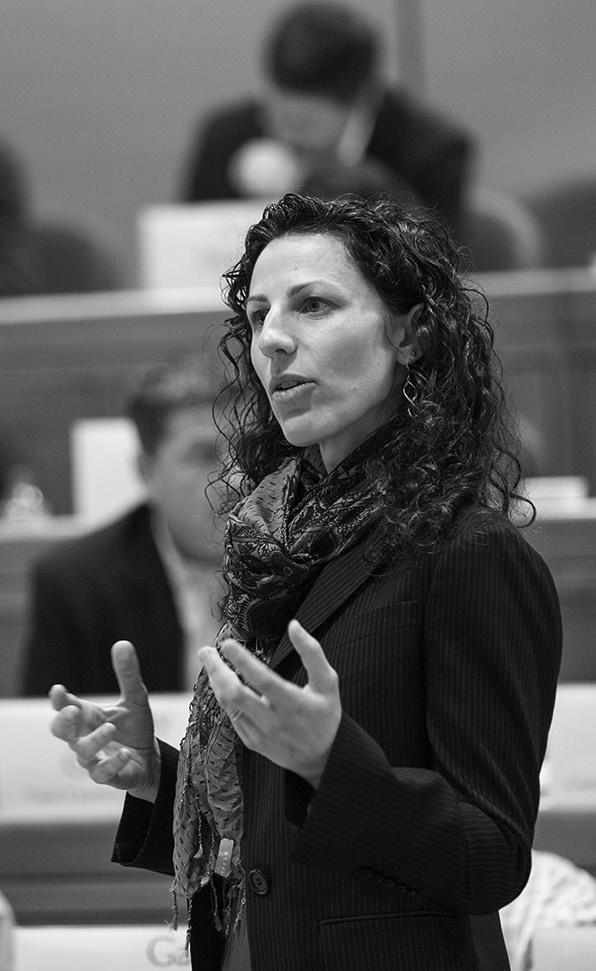
“You can’t make a person go to therapy, but you can recommend them to go to therapy,” Dailey said. “At each and every point that Melanie Northrop had an encounter with Luke Tang, she encouraged him to be in therapy.”
Heinlein described Northrop as the “only liaison” between Harvard and McLean Hospital, who had access to a “wealth of knowledge” about Tang’s condition and diagnosis but failed to adequately act on that knowledge.
“Melanie Northrop did not exercise care. She failed to comply with the standard of care by the average qualified social worker case manager,” he said.
“What she did is let this type 2 student self-diagnose, self-report, and self-treat, with the full understanding that Luke would not diagnose, report, or treat,” Heinlein added. Heinlein reiterated the “harms and losses” of the suit, adding that there were two types of damages Tang’s family could recover — damages from Tang’s “conscious physical and mental pain and suffering” and punitive damages.
Dailey argued in his opening argument that Tang showed “no warning signs” and “no symptoms” prior to dying by suicide.
Dailey said that Northrop did “what a case manager is supposed to do.”
When Tang finished his spring semester of his first year at Harvard, Dailey said Tang “did superb” and went on a retreat with his friends before leaving for China. Upon Tang’s return to Harvard from China in the fall, Dailey stressed multiple instances of Tang denying suicidal thoughts. “There were no warning signs, there were no symptoms. He never reached out to my client,” Dailey added.
Dailey said that suicide is “an unfortunate fact of our society” and concluded his statement by asking the jury to answer with “good common sense” if Nothrop was negligent in her duties.
Two witnesses — then Harvard staff psychologist Maureen O. Rezendes ’83 and Vanessa Cuthbert, a clinical social worker at McLean Hospital who served as Tang’s case manager during his stay —
faced direct and cross-examination on Tuesday. Rezendes and Cuthbert are two of 25 witnesses called to testify at the trial — a list that includes Tang’s family, Harvard employees, and medical professionals who had interacted with Tang. Pappas allowed Harvard’s motion to not compel Harvard officials — who were initially called as witnesses by Tang’s family — to testify in the trial.
Wednesday
On the second day of the trial, Alex Redcay — a licensed clinical social worker who served as the expert witness — said Northrop did not meet the standard of care required of a licensed social work case manager. Redcay faced aggressive cross-examination by Dailey, who interrogated Redcay over her grasp of case documents and her evaluation of the care provided to Tang. Heinlein first asked Redcay to define the standard of care required of social workers by the National Association of Social Workers in their code of ethics. According to the NASW, the standards include a duty to know about their clients’ issues, assess their clients, and imple-

ment care plans for them. Redcay alleged that Northrop failed to uphold her standard of care for Tang on several counts.
According to Redclay, Northrop was obligated to obtain the full report of Tang’s discharge from McLean Hospital, where he had spent a week in April 2015, and develop an adequate “safety plan” with coping strategies and contact information with supportive affiliates. Redclay alleged that Northrop failed to fulfill these duties.
Instead, Northrop “did the opposite” of creating a support network for Tang, according to Redcay. On May 1, Tang signed a “care contract” with the College detailing conditions for his continued enrollment at Harvard. The contract included an agreement that when Tang felt “distressed,” he would turn immediately to healthcare professionals. “If you feel distressed or if you feel any inclination to harm yourself, you will not rely on friends or clergy, and you will instead take your concerns immediately to HUHS Urgent Care or to the Cambridge City Hospital,” the contract stated. Tang attempted to change the contract during his meeting with Shapiro, according to the suit. In a copy of the contract submitted as evidence during the trial, Tang left several annotations, including strikethroughs of the words “you will not rely on friends or clergy,” “instead,” and “immediately.”
The terms of the contract were non-negotiable, according to the suit.
Redcay criticized the contract and especially the line barring Tang from consulting friends, saying it took away “the greatest support people can have” and calling the contract “punitive.”
“They’re merging an academic contract with a safety plan,” Redcay said.
During the meeting after Tang’s discharge, Northrop told Tang then that he needed to “speak with his therapist about a support plan in China and that he would be expected to continue his treatment when he returned to the college and Lowell House,” according to the lawsuit.
However, Redcay alleged that Northrop failed to ensure “continuity of care” for Tang over the summer and did not find an appropriate therapist for him upon his return to campus in the fall.
Redcay described the levels of being at-risk for suicide, saying clients at the highest risk of suicide were those who had previous attempts. “We’ve established he attempted suicide — that he was at the highest risk, he minimized issues,” Redclay said. She added that, in her view, an effective safety plan could have “prevented” Tang’s death. Dailey, who led Redcay’s cross-examination, launched into a series of leading questions about Northrop’s care of Tang and Redcay’s review of the records of the case. Dailey asked Redcay to recall several details regarding Tang’s treatment at McLean Hospital and her evaluation of whether the aftercare plan formulated by his treatment team followed the standard of care. Redcay said she had reviewed the McLean Hospital report for the trial and that nobody could “review thousands of documents.”
Thursday
On the third day of the trial, CAMHS employee David W. Abramson said that despite being listed on a care contract with Tang, he was never consulted about Tang’s wellbeing.
and three
witnesses discussed Tang’s stay at McLean Hospital and his care contract with the College. Shapiro testified on Thursday and said she helped adapt a “boilerplate” text to draft the contract that
Care contracts are used by the College to condition a student’s continued residence or enrollment on their participation in “counseling or other medical treatment,” when the student “does not voluntarily seek help to ameliorate them,” according to the College’s student handbook.
to healthcare professions. She said this agreement had been specific to Tang and custom added to his contract. Shapiro added that the care contract is designed to “support a student to be healthy and to be a student at the College.” “Our students for the most part want to be here, want to be at Harvard,” Shapiro said. “The contract is centering health within the context of being enrolled or in residence.” Lydia Y. Cho, a psychologist at McLean Hospital who conducted
tion by Northrop’s attorneys during Thursday’s trial. Cuthbert responded to questions about her clinical summary of Tang and her discussion with him about receiving therapy. “We couldn’t legally force him against his will to go to
Embattled Harvard Business School professor Francesca Gino faced multiple allegations of plagiarism in an analysis published by Science Magazine. COURTESY OF FRANCESCA GINO the College and his dormitory in Lowell House. The suit states that
May
— the day he left for China — and the day he
12,
between
16, 2015
died, Sept.
2015, Tang did not receive mental health treatment.
denied being consulted about the contract and said he had not known about Tang until after his death in September 2015. During her testimony, Shapiro addressed the agreement in the contract that stipulated that when Tang felt “distressed,” he would immediately turn
a neuropsychiatric test on Tang for his discharge report, also testified Thursday. Cho, who claimed to have no recollection of Tang, clarified her psychological evaluation of him and the recommendations she offered for Tang’s future treatment. Cuthbert faced cross-examina-
therapy,” Cuthbert said. “It was our recommendation — what we believed would help him.” “It seemed Harvard’s recommendation was that he see an outpatient therapist before coming back to Harvard,” she added. “At the same time, I think it’s fair for him to know just because Harvard wants him to see a therapist, he doesn’t have to, but there might be consequences with going back to school.” Trial in Wrongful Death Lawsuit Against CAMHS Employee Begins NEWS 4 APRIL 12, 2024 THE HARVARD CRIMSON BY KYLE BAEK AND BENJAMIN ISAAC CRIMSON STAFF WRITERS HARVARD BUSINESS SCHOOL kyle.baek@thecrimson.com benjamin.isaac@thecrimson.com michelle.amponsah@thecrimson.com joyce.kim@thecrimson.com william.mao@thecrimson.com “BORROWED TEXT.” HBS Professor Francesca Gino, already facing data fraud allegations, was accused of plagiarism. TANG TRIAL FROM PAGE 1 Catherine R. Shapiro, Senior Resident Dean, testifies on the third day of the trial, which is being held at the Middlesex Superior Court in Woburn, Mass. JOYCE E. KIM — CRIMSON PHOTOGRAPHER
Abramson
other
Luke signed in consultation with Northrop and Abramson, who are both listed in the contract. Abramson, however,
Dean Says Presidential Search Not Begun
Faculty of Arts and Sciences Dean Hopi E. Hoekstra said in a Wednesday interview that Harvard’s governing boards have not launched the search for the University’s 31st president — even behind closed doors. Hoekstra met with the Board of Overseers — the University’s second-highest governing body — during their regularly scheduled meeting last weekend. She said the presidential search was not discussed at the portion of the Overseers’ meeting she attended.
“To my knowledge, the presidential search has not begun yet,” Hoekstra said.
Members of the Harvard Corporation — the highest governing body — and the Overseers were on campus last weekend, but Hoekstra’s comments signaled that Corporation Senior Fellow Penny S. Pritzker ’81 will continue to take her time before announcing a formal presidential search committee.

The University’s current timeline — with no search committee announced three months into the tenure of interim Harvard President Alan M. Garber ’76 — is a stark departure from recent precedent. In each of the last two presidential searches, a committee was announced within one month of the sitting president’s announcement that they would step down.
A house aide, who spoke to The Crimson on the condition of anonymity for fear of retaliation, said it is a “weird feeling” that “kind of taints the whole thing.”
“We’re working on something that will materially change my working conditions permanently and will change my relationship with my bosses and with my colleagues,” they said, but HURA “not only never asked my opinion about it, but set out specifically to not let me know about it.”
“It makes it harder for me to believe that this is a venture in trying to make the work environment better for everybody and not trying to make the work environment better for a more selective group of people who are involved in the process,” the house aide said.
In an internal HURA document obtained by The Crimson, organizers wrote that “senior tutors, tutors who are very aligned with administration” should not be contacted until “later.”
In a statement to The Crimson, HURA organizers wrote that since the group’s formation, “dozens upon dozens of tutors, proctors and house aides have shaped the union’s priorities.”
“Even at the earliest stages of organizing, when the personal risk of employer retaliation was greatest, proctors and tutors tirelessly gathered input from as many colleagues as possible,” they added. The union’s troubles with communication have also permeated into in-person interactions. Though Raman said “people know how to disagree in a civ-
il manner,” others have claimed that group meetings have become increasingly not conducive to open dialogue.
Gunn said that though there is “full participation,” issues arise when “sometimes people will not be as respectful as they should be.”
“Some folks that are particularly anti-union can be quite vocal and can take up a lot of the time,” Gunn added. Piou alleged that much of the disagreement is due to incorrect information surrounding the upcoming union elections.
“Reasonable people can reasonably disagree,” Piou said, “but a lot of these concerns seem to be based off of premises that are just patently untrue.”
“That’s made dialogue very difficult, especially when a lot of these arguments are circulating within their own little pockets and then bubble out,” he added. But the frustrations around lack of open discourse are battled by strong fears of conflict between close colleagues and neighbors.
“I can’t leave,” a house aide said. “I live with them. I live in the same building. I eat with them every day twice a day.”
“The fear of having a problem with somebody far outweighs my desire to debate this on an open stage,” they added.
‘Already a Good Deal’
Beyond concerns surrounding the union’s inconsistent communication, some advisers are also skeptical of the push to unionize at all.
The shift in pace may mean that Harvard’s governing boards have approved of Garber’s leadership, which follows former Harvard President Claudine Gay’s tumultuous resignation in January. It also increases the likelihood that the Corporation is prepared to let Garber stay in office
through the next academic year.
Two weeks ago, Harvard Medical School Dean George Q. Daley ’82 said in an interview with The Crimson that he wants Garber to become the next permanent president. Hoekstra declined to echo Daley’s endorsement but said she expects Garber to be a contender for
the position. “He provides a deep knowledge and love of Harvard, a sense of steadiness, and I think we’re in incredibly good hands with President Garber,” Hoekstra said.
The forthcoming presidential search committee is expect-
BDS Caucus spokesperson said in an interview that “while HGSU-BDS members helped write this letter, this is very much a University-wide effort and not a campaign inclusive to the caucus.” The letter cites Harvard’s
One house aide suggested that some advisers may be taking their positions for granted.
“It seems to me it’s already a good deal for most people — the vast majority of people — and that they’re sort of pushing it,” they said. “You’re incentivizing the University to replace you or to make you cheaper.”
Raman, the Lionel proctor, also said proctors already receive support in their roles, praising the College’s Dean of Students’ Offices for being “receptive and welcoming and amenable to feedback.”
“I feel that I can address concerns that I have within the existing structures, so that’s why I’m still unclear about the question around representation within HURA,” he said.
The swirling doubts haven’t escaped HURA’s notice, with union organizers attempting to explain their mission to colleagues.
“What we’re trying to explain is, ‘Hey, we’re really happy that this works for you,’” Gunn said, “‘but currently, all of that can flip on a dime.’”
Piou, the Quincy tutor, also pointed to the ability of a union to bring equality of opportunity and benefits to all residential advisers.
“The benefits and security and joy and pride I have in my work aren’t consistently felt across the College,” Piou said. “The big thing for me is that the union offers the possibility for there to be a floor because we’re at-will employed, and all of these benefits can be taken away at a moment’s notice.”
Tensions have also been heightened by differences between proctor and tutor status at the University, both of which HURA has included under the same bargaining unit. According to Harvard’s websites, there are currently about 200 tutors and 60 proctors across campus.
“Lots of proctors are worried about ‘Okay, well, tutors outnumber us, tutors are leading this effort,’” Gunn said, making proctors feel they’re simply “along for the ride.”
According to the statement from HURA, the organizing committee has “grown by several members — including proctors” since their February public announcement.
Still, according to one proctor, “most of the proctors felt like they were placed on this train, the train has left the station, and there’s no way to get off.”
‘A Stain’
On Wednesday, HURA’s internal tensions received attention from the University. In an email to proctors, tutors, and house aides obtained by The Crimson, Harvard College Dean of Administration and Fiance Sheila Thimba wrote that the University has received “complaints concerning HURA’s conduct.”
The email — which stressed that administrators “strongly oppose this conduct” — pointed to “a message suggesting that HURA will remember those who opposed unionization when it comes time for collective bargaining.”
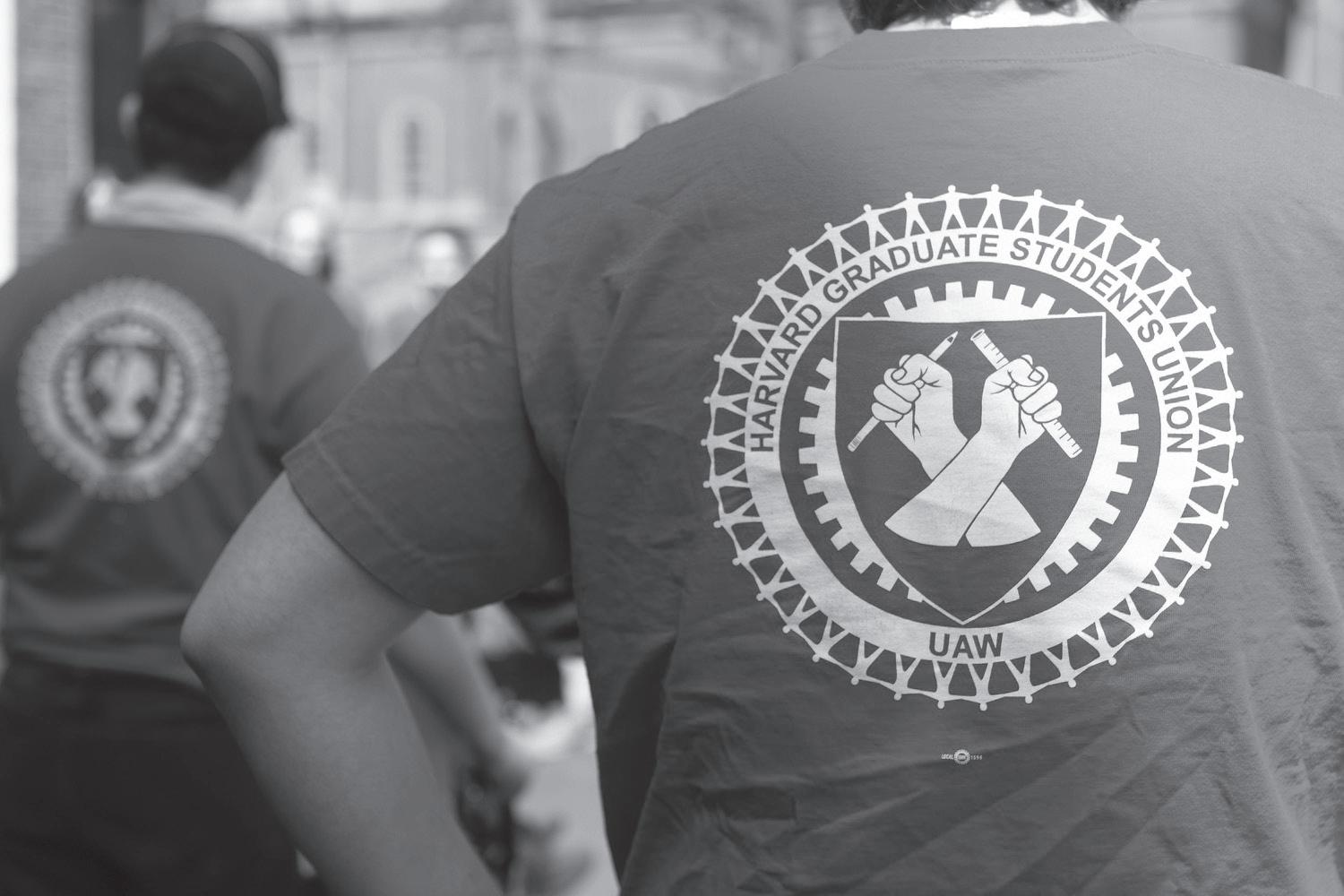
The statement seemingly referenced an internal proctor Slack message obtained by The Crimson in which a proctor wrote that when bargaining begins, “there will be very recent memories about who was helpful.”
HURA denied the allegations in an email to proctors, tutors, and house aides later that day, writing that they “denounce any form of coercion and intimidation.”
“We denounce in the strongest terms the university’s use of employee-wide email lists to circulate misinformation about unionization and allegations regarding HURA’s conduct,” the email read.
Both Thimba and HURA organizers encouraged people to contact the NLRB if they felt their rights had been violated.
The email from Thimba also acknowledged a formerly public list of all proctors, tutors, and house aides who had not signed a union card, along with their house and phone numbers. According to the list at the time, 185 members of the proposed units — out of a potential 345 — had not signed.
In a later Slack message obtained by The Crimson, a HURA organizer said the list “existed before the union filed so that people could reach out to folks who didn’t sign to have a conversation about the union.”
In an emailed statement to The Crimson, Brandon M. Martinez ’20, a HURA organizer, said the list became public after “someone dug back into the email archive, came across an archived database, and decided to
share that database outside of the union’s membership.”
Despite HURA’s apology, Gunn acknowledged that the incident was less than helpful for HURA’s mission.
“I think one of our chief tasks is to inspire competence,” Gunn said, and “that is a stain on that effort, irrespective of the apologies and the lessons learned.”
Despite lingering pressures within the union and across residential advisers, some acknowledged that HURA leadership has since attempted to course-correct. One proctor, who spoke to The Crimson on the condition of anonymity due to fears of retaliation, pointed to organizers changing the time of a town hall following feedback that the original time prevented Muslim proctors from attending due to fast breaking. Gunn also spoke broadly to HURA’s shifting approach to organizing, saying “they’ve owned up to everything.”
“They’ve not only issued apologies, but they’ve completely revised their strategy,” he said.
“At this point, I think they’ve overcorrected,” Gunn added. “They’re really going out of their way and I appreciate it.”
But as the union recognition election looms, some have remained unconvinced by HURA’s remedial efforts.
“I do not trust HURA, and I do not trust them to represent me at the bargaining table,” one proctor said.
ed to comprise all 12 members of the Corporation and three Overseers. Historically, the University has assembled advisory committees of faculty, students, and staff to offer input on the search. During the search that resulted in the selection of former Harvard President Lawrence S. Bacow, Hoekstra served on the faculty advisory committee as a representative of the FAS’ Division of Science. Harvard’s governing boards generally operate in private, with past presidential search processes drawing criticism for their lack of transparency. Corporation members and senior Harvard administrators have defended the opacity of past searches, saying confidentiality is necessary to recruit and vet candidates. In the Wednesday interview, Hoekstra did not answer whether she believed the presidential search process should be more transparent. Instead, she pointed to her experience on the faculty advisory committee to highlight existing avenues for faculty input. “Part of our job was also to talk with faculty colleagues to express their views on the presidential search,” Hoekstra said. “From that perspective, there is a lot of faculty input into this process.”
In an interview with The Crimson, Hoekstra said Harvard’s governing boards haven’t launched the presidential search. JULIAN J. GIORDANO — CRIMSON PHOTOGRAPHER NEWS 5 APRIL 12, 2024 THE HARVARD CRIMSON ADMINISTRATION BY TILLY R. ROBINSON AND NEIL H. SHAH CRIMSON STAFF WRITERS tilly.robinson@thecrimson.com neil.shah@thecrimson.com FAS. Faculty of Arts and Sciences Dean Hopi Hoekstra said the presidential search has
not started.
LABOR FROM PAGE 1 The Harvard Graduate Students Union-United Auto Workers’ Boycott, Divestment, and Sanctions Caucus circulated a letter earlier this month calling on Harvard to investigate and divest from “companies and institutions involved in the ongoing attacks in Gaza.” The letter says signees are “concerned that Harvard’s investments and institutional ties have rendered the University materially complicit in the Israeli occupation of Palestine,” calling on the University to “conduct an inquiry into investments in companies and ties with institutions profiting from the ongoing attacks in Gaza, to disclose these ties publicly, and to divest from them immediately.” As of Wednesday evening, the letter has garnered 576 individual signatories and is endorsed by 20 Harvard organizations, including other unions. The circulation of the letter comes after the Harvard Law School Student Government and Harvard Divinity School Student Association passed resolutions calling for Harvard to divest from illegal settlements in Palestine. A HGSU-UAW
previous divestments from “companies selling products to the South African military,” tobacco stocks, and the fossil fuel industry. It also cites an article in The Crimson, which reported that the Harvard Management Company still held “nearly 200 million in companies tied to Israeli settlements in Palestine.” In response to a request for comment, Harvard spokesperson Jason A. Newton pointed to a previous statement in response to both the HLS Student Government and HDS School Student Association resolutions. “Harvard
boycotting
The HGSU-UAW’s BDS Caucus is
unaffiliated caucus
HGSU-UAW, but all caucus members are members of the broader union. The HGSU-UAW BDS spokesperson said the caucus’ “connection to labor is quite simple.” “We don’t want to be paid with the profits of investments in Israeli apartheid, occupation and genocide,” the spokesperson said. “We don’t want our scholarship, labor, and research to be used in the service of Israeli apartheid, occupation and genocide.” “We don’t want our workplace, Harvard, to lend its name, reputation, legitimacy and resources to the actions of Israeli institutions involved in the destruction of the Palestinian people,” they added. According to the HGSU-UAW’s BDS Caucus spokesperson, the campaign is still in its early stages. The caucus is not planning to deliver the letter to Harvard administrators “until it reaches a minimum of 1,000 signatures,” they said. HGSU Caucus Circulates Letter Asking Harvard to Divest from Israel BY ARAN SONNAD-JOSHI AND SHEEREA X. YU CRIMSON STAFF WRITERS aran.sonnad-joshi@thecrimson.com sheerea.yu@thecrimson.com The HGSU-UAW BDS Caucus circulated a letter calling on the University to divest from Israel. FRANK S. ZHOU — CRIMSON PHOTOGRAPHER
As Union Election Looms, Residential Advisers Face Group Tensions aran.sonnad-joshi@thecrimson.com sheerea.yu@thecrimson.com
leadership has made clear that it opposes calls for a policy of
Israel and its academic institutions,” Newton wrote at the time.
an
not officially affiliated with
Rep. Elise M. Stefanik ’06 (R-N.Y.) accused Harvard of delaying “justice” for students involved in a confrontation during a pro-Palestine protest at Harvard Business School in October, according to a letter sent to University leadership Thursday morning.
In her letter, Stefanik revealed that the two students who allegedly assaulted an Israeli first-year HBS student during the protest could face criminal charges at court hearings in May. At an Oct. 18 “die-in” protest, the first-year HBS student began filming demonstrators’ faces as they laid on the ground. Some protesters held up security vests and keffiyehs — a traditional Palestinian headscarf — to prevent the student from filming and came into physical contact with him.
The FBI opened an investigation into the incident days after the confrontation occurred. In her letter, which was addressed to interim Harvard President Alan M. Garber ’76 and Harvard Corporation Senior Fellow Penny S. Pritzker ’81, Stefanik accused the University of stalling the investigation.
“Justice for this incident should have been served quickly, and the delay of justice that specifically allows an antisemitic student to graduate is an affront to accountability and demonstrates the cultural rot of Harvard University’s leadership that has allowed antisemitism to
continue,” she wrote. The letter is the latest in a string of letters from members of Congress and congressional committees accusing Harvard of failing to adequately address campus antisemitism. According to Stefanik’s letter, Harvard hired the law firm Jenner & Block to independently investigate the incident and that court dates for two students involved in the confrontation are currently being negotiated by local prosecutors. The confrontation was filmed by observers and captured on aerial footage of the protest. One of the protesters involved in the confrontation, Elom Tettey-Tamaklo, a second-year student at Harvard Divinity School, was indefinitely relieved from his duties as a Thayer Hall proctor in November following the event.
Former president Claudine Gay said at the time that the University would conduct its own probe after law enforcement agencies concluded their work. The launch of Harvard’s investigation indicates that the FBI is no longer looking into the matter, although no results have been publicly released.
Stefanik wrote that the “Clerk’s Hearing” — where a clerk assesses allegations of a misdemeanor crime against the accused before formally filing charges — had been postponed to May 7. It is unclear what role Harvard had, if any, in the delay of the hearing. Stefanik did not provide any specific evidence in her letter.
Stefanik wrote that they delay would allow one of the students involved — Tettey-Tamaklo — to graduate this spring with a Harvard degree “despite having committed a well-documented antisemitic hate crime.” Tettey-Tamaklo is expected to
graduate from HDS in May 2025, according to the University’s alumni directory. It is unclear if the University is considering expulsion over the incident.
In response to the letter, Harvard University spokesperson Jonathan L. Swain wrote that “antisemitism has no place” at Harvard. “We remain steadfast in our commitment to combating antisemitism, in whatever form it manifests itself and our ongoing efforts to ensure that Jewish students feel safe, valued, and embraced at Harvard,” he added. Stefanik’s letter comes after months of congressional scrutiny over the University’s response to Hamas’ Oct. 7 attack on Israel and concerns of campus antisemitism. The House Committee on Education and the Workforce —



of which Stefanik is a member — subpoenaed three top University officials two months ago and requested a number of internal documents. While neither the University nor the committee had publicly released private documents submitted in response to the February subpoenas, Stefanik’s letter indicates the University submitted documents related to ongoing disciplinary procedures. After the University submitted documents, Committee Chairwoman Virginia Foxx (R-N.C.) accused Harvard of “malfeasance” and said the committee would consider future action.
a month has passed since the committee raised the possibility of additional action, and a spokesperson for the committee declined to comment Thursday on where the investigation stands. 2
HBS Protest
STEFANIK BY EMMA H. HAIDAR AND CAM E. KETTLES CRIMSON STAFF WRITERS
NEWS 6 APRIL 12, 2024 THE HARVARD CRIMSON CONGRESS. Elise Stefanik said Harvard delayed “justice” for students involved in a confrontation at HBS. Celebrate Everything
Over
Could Face Charges Over
ELISE
emma.haidar@thecrimson.com cam.kettles@thecrimson.com
SUDDEN REVERSAL.
Harvard College will reinstate its standardized testing requirement in admissions, starting with the Class of 2029.
Harvard College will reinstate its standardized testing requirement in admissions beginning with the Class of 2029, a surprise reversal that could leave some students scrambling to take SAT or ACT tests ahead of application deadlines in the fall.
The decision comes in the face of Harvard’s previous commitments to remain test-optional through the admitted Class of 2030, a policy that was first instituted during the pandemic.
Harvard had faced mounting criticism from both academics and admissions experts for continuing its test-optional policies, even as its peer institutions returned to requiring standardized tests. In recent weeks, Yale, Dartmouth, and Brown have announced returns to required testing.
All applicants to the Class of 2029 — due to apply in the fall and winter of 2024 — will be required to submit SAT or ACT scores, barring specific cases in which they may be unable to access such exams, according to the College’s announcement. In such cases, scores from exams such as Advanced Placement or the International Baccalaureate will be accepted as substitutes. Dean of the Faculty of Arts and Sciences Hopi E. Hoekstra wrote in a statement that “standardized tests are a means for all students, regardless of their background and life experience, to provide information that is predictive of success in college and beyond.” “More information, especially such strongly predictive information, is valuable for identifying talent from across the socioeconomic range,” she added. “With this change, we hope to strengthen our ability to identify these promising students.”
The majority of undergraduates entering Harvard in the past four years have submitted standardized test scores, according to the release, which did not specify
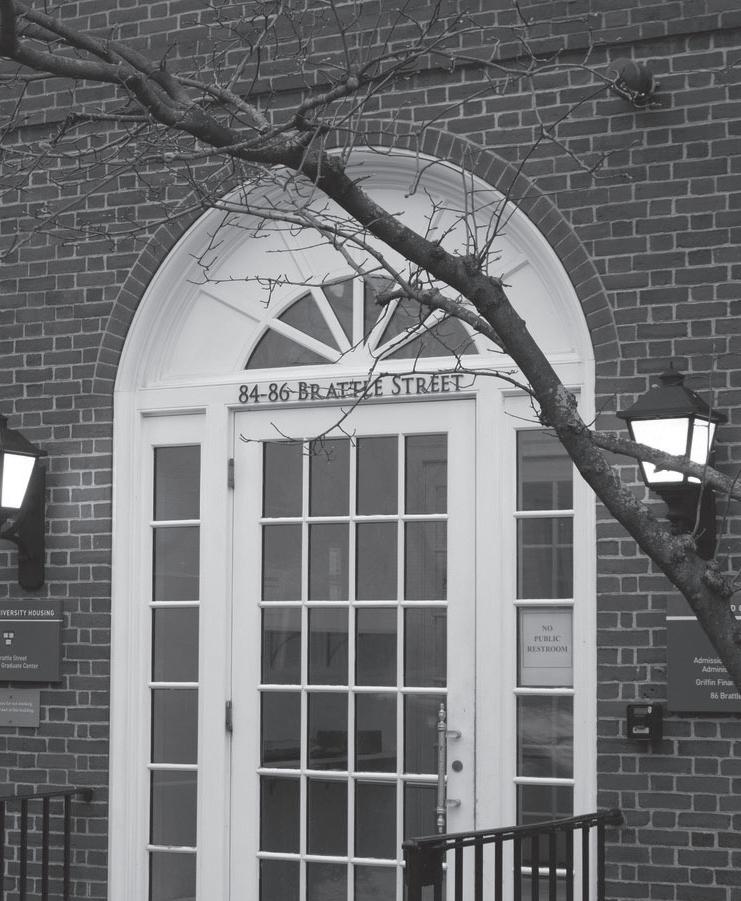
an exact percentage. Harvard officials have recently hedged on whether the College would reinstate its testing requirement. In early March, Hoekstra told The Crimson that Harvard
was “in the midst of analyzing” its policy.
Harvard College Dean of Admissions and Financial Aid William R. Fitzsimmons ’67 said in an interview in late March that the
College had “nothing new to report” on whether its testing policy through the admitted Class of 2030 would be changing. In its press release, Harvard referenced a study from Harvard-af-
filiated initiative Opportunity Insights, led by Brown University economist John N. Friedman ’02 and Harvard economists Raj Chetty ’00 and David J. Deming, which found that SAT scores are a partic-
ularly strong predictor of college success – much more so than a student’s high school grade point average.
Some experts also said that a return to requiring standardized test scores could help universities like Harvard increase the racial and socioeconomic diversity of its student body.
Deming, a finalist to serve as dean of the Harvard Kennedy School, wrote in a statement that the requirement of standardized test scores provides the “fairest admissions policy for disadvantaged applicants.”
“Not everyone can hire an expensive college coach to help them craft a personal essay. But everyone has the chance to ace the SAT or the ACT,” Deming wrote. When Yale and Dartmouth reinstated their testing policies, both institutions referenced the predictive power of standardized testing as a key incentive for its return as a mandatory component of the admissions process.
Still, the College’s announcement — made exactly two weeks after it released admissions decisions for the incoming Class of 2028 — has exposed it to criticism.
The Generational African American Students Association, a student organization at Harvard, posted a statement on Instagram Thursday afternoon blasting the College’s return to required testing. The policy change “strikes at the very heart of the progress made toward achieving true equal opportunity within higher education institutions such as Harvard,” the group wrote.
“This decision also compounds the challenges already faced by low-income and minority students in the wake of affirmative action being overruled,” they added. A College spokesperson declined to comment on the criticism of the policy reversal. Harvard’s reversal of its commitment to stay test-optional through the next two admissions cycles came with little warning to applicants for the Class of 2029, who have six sittings of the ACT and the SAT left before Harvard’s regular decision
elyse.goncalves@thecrimson.com
matan.josephy@thecrimson.com
To Co-Host Jewish Grad Celebration for First Time
For the first time in University history, Harvard will co-host Hillel’s affinity celebration for Jewish students at this year’s graduation ceremonies. The addition comes after six months of sustained national criticism over Harvard’s handling of antisemitism on campus, culminating in the resignation of former President Claudine Gay. The University is currently under investigation by the House Committee on Education and the Workforce over allegations of antisemitism.
Amid the firestorm, some
prominent critics — including right-wing activist Christopher F. Rufo — took aim at the University for holding affinity celebrations for other marginalized groups but none for Jewish students, calling it symptomatic of broader issues around Harvard’s diversity, equity, and inclusion initiatives.
“Harvard provided racially segregated ‘affinity group’ celebrations at its commencement event earlier this year,” Rufo said in a Dec. 14 X post, which was amplified by X owner Elon Musk. “Whites and Jews were the only groups not provided with celebrations.” Though Hillel has hosted unofficial graduation celebrations for years, this will be the first year
in which the event is formally recognized — and organized — by the University.
Hillel Campus Rabbi Getzel Davis said the event comes after a “terribly difficult” year for Jewish and Israeli students. “We should have been having these affinity graduations for just as long as there have been affinity groups, and it’s a little worrisome that no one has thought about this until this year,” he said.
Due to safety concerns, Davis said the celebration will be held at Hillel, the University’s Jewish center. “We are going to be gathered in the Hillel building, which is because of us looking for safety,” he said. “So many events have been
disrupted over the past year — years. We’re going to hopefully have members of the administration there.”
The affinity celebrations — which take place the same week as the general commencement in May — serve as supplementary events where students can commemorate graduation and their various identities. Other celebrations include disability awareness, global indigenous graduates, first generation and low income, among others.
The University also introduced the first-ever affinity celebration for Asian American, Pacific Islanders and Desi-American students in 2022, following advocacy efforts from student organizers.
Sherri A. Charleston — Harvard’s chief diversity and inclusion officer — wrote in a statement to The Crimson that the University is “proud to support the efforts of our students who organize these events open to the entire Harvard community.”
The affinity celebrations are open to all students and often feature speakers, merchandise giveaways, and performances.
Graduate School of Education student Moriah R. Lit said she was “thrilled” to hear about the Jewish commencement celebration. “It gives us a special place to really celebrate and uplift the Jewish voices in our community, and have family or friends come and share the joy of graduation,” she said. Lit said that because Harvard general commencement allows a very limited number of guests, the “secondary ceremony” allows friends and family to recognize their students’ accomplishments. Kris King ’24, who helps plan the Lavender celebration for LGBTQ+ and the Disability celebration, called the events “crucial.” “We have students who have a variety of experiences, who share commonalities throughout their time at Harvard and come from backgrounds that deserve to be celebrated and recognized,” they said.
Many Harvard students said that they appreciated the opportunity to hang out with friends and enjoy the warm weather as much as they liked seeing the eclipse. “I think the coolest part about this is just how unifying it is,” said Alvira Tyagi ’25, who met up with friends on the bridge to watch the eclipse. “No one has a pset out,” she added. “I didn’t bring my backpack.”
In the Science Center plaza, hundreds of people gathered for a watch party. “It’s kind of nice to see the greater Cambridge community come together to watch this,” said Aarna Sitani ’27. “It’s been a really big deal growing up and I’m just excited to experience it for the first time with all my friends in college,” she
added. Derek Yuan ’25 said he regretted not attending the last solar eclipse and did not intend to make the same mistake this year. “Today, I’m skipping class,” he said. Outside the Science Center, the watch party was a “joint endeavor” between many interested groups, according to Allyson Bierlya, an astronomer and manager of the Harvard Astronomy Lab and Clay Telescope. “It started with the Astronomy Department and the Physics Department, and the undergrad clubs,” Bierlya said. “Everybody’s kind of bringing a different aspect to it.”
Bierlya, like some Harvard affiliates, went to great lengths to get the best view of the eclipse. She traveled to Arkansas to observe complete totality.

applica-
deadline on Jan. 1 — and even fewer before its early action deadline of Nov. 1. NEWS 7 APRIL 12, 2024 THE HARVARD CRIMSON BY ELYSE C. GONCALVES AND MATAN H. JOSEPHY CRIMSON STAFF WRITERS
tion
BY SALLY E. EDWARDS AND ASHER J. MONTGOMERY CRIMSON STAFF WRITERS sally.edwards@thecrimson.com
Harvard students seemed to be everywhere but the classroom on Monday, as undergraduates admired the total solar eclipse. Some Harvard affiliates gathered along the Charles River and in the Science Center plaza to view the rare celestial event, but others traveled further — to Vermont, Arkansas, and Texas — to enjoy the eclipse from the path of totality. Eli B.M. McGill ’24 said he drove to Montpelier, Vermont to observe
he added. Though some students traveled outside of Cambridge to view the eclipse, Harvard’s campus was still abuzz Monday afternoon with some organized viewing parties. The Dean of Students Office organized a watch party on the John W. Weeks Bridge, where they handed out eclipse glasses to groups of friends.
Harvard
asher.montgomery@thecrimson.com
totality. “Nature kind of freaked out for a moment,” McGill said. “The earthworms started coming out of the ground and the flowers closed up like it was nighttime. The birds started calling, the owl started hooting.” “It was pretty eerie,”
She said she has “become an eclipse chaser” and will likely travel to Spain, Iceland, or Greenland to observe the next big eclipse in 2026. William J. Gottemoller ’27 traveled all the way to Burnet, Texas to watch the eclipse in totality. “I booked refundable tickets and hoped that my midterms did not align with when I was gonna be gone,” he said. “The thing about a total solar eclipse is that you see things in the night sky and you see things just even around the sun that you never would see otherwise,” Gottemoller added. Though many people said they were in awe of the eclipse, some who stayed on campus felt disappointed at the lack of totality. “I expect to see a total eclipse. I haven’t,” said Graduate School of Design student Charles Song. “Tell the sun to do better next time.” But McGill, the student who traveled to Vermont to be in the path of totality, said skipping class was “worth it.” “There are some things that are a lot more important than school,” he added. “I would say this is one of them.” Harvard Affiliates Skip Class and Town To View Solar Eclipse BY ALEXANDER Z. GONG, AISATU J. NAKOULIMA, AND KENITH W. TAUKOLO CONTRIBUTING WRITERS Harvard students watch the eclipse from Weeks Bridge on Monday. DANIEL MORALES ROSALES — CRIMSON PHOTOGRAPHER Harvard To Require Test Scores for Next Admissions Cycle ELYSE C. GONCALVES — CRIMSON PHOTOGRAPHER ADMISSIONS
28 Vocab Words for the Class of 2028
WELCOME. As you take in Harvard’s campus, Class of 2028, here are 28 vocabulary words to guide you through your visit!
BY ELLEN S. DING CRIMSON STAFF WRITER
Class of 2028: let us be the millionth to say, welcome to Harvard! Here in the ivory tower, we have a lot of lingo that we will immediately throw around without explaining anything. We, that is, meaning people other than Flyby Blog, the best/coolest/most fun section of The Harvard Crimson (the school newspaper you’re currently reading — we’ll give you that one for free). So, trust us to give you everything you need to know to not be lost, literally and figuratively, during this weekend and the next four years!
1. The Yard The historic home of the freshmen (unless you’re in the Quad of the Yard Crimson Yard), the not-John Harvard statue, and flocks of tourists.
2. The Houses Like Harry Potter, first-years are sorted into one of the twelve upperclassmen houses. Each House has their own Deans, advising team, dining halls, libraries, gyms, and special amenities such as massage rooms and student-run grilles. What’s the best one, you ask? The one you get randomly sorted into.
3. The Quad Located on the old Radcliffe campus, the Quad is home to three upperclassmen houses, some of the best food on campus, and the best dogspotting. Quadlings (Quad residents) will tell you it isn’t that far, but the fifteen-minute walk says otherwise (please don’t come for me).
4. The SEC Short for Science and Engineer-
ing Complex, the SEC is the cheesegrater-like innovation hub on the Allston campus. There, you’ll find a majority of engineering and computer science classes, state-of-theart technology, free (!!) acai bowls and coffee, and a plethora of Trader Joe’s snacks, a student-favorite grocery store right across the street.
5. Berg Annenberg (Berg) is the freshman-only dining hall. As a firstyear, this is where you’ll experience heartbreak, tourist break-ins, the best friendships and the worst fights. Fun fact to share with your family: Berg is the inspiration for Hogwarts’ Great Hall and has the largest collection of secular stained glass in the country.
6. Dhall “Dee-hall”. Short for dining hall.
7. HUDS (“hudds”)
Harvard University Dining Services, with the nicest staff in the dining halls!
8. Blocking Don’t worry about it yet.
9. Punching
Don’t worry about it yet, part 2.
10 . Entryway
The first community you will have at Harvard! An entryway is composed of 20-30 first-years in the same dorm, overseen by a live-in proctor (see below) and a peer advising team who will organize delicious study breaks.
11. Proctor The equivalent of an RA at other colleges. Typically a graduate student or Harvard employee who lives in the freshman entryway and can support you with anything from laundry to life advice.
12. PAF (paff)
Each freshman is assigned a Peer Advising Fellow, an upperclassman who can share unique insights about any and all things Harvard student life.
13. Widener / Lamont / Cabot Science Library Harvard libraries! Each has their own vibe, which you can read more about here!
14. The Mac Gym bros and professors alike frequent the Malkin Athletic Center (dubbed ‘The Mac’). Go there to get your anger out or see your history professor sweating over Ally Love’s 45-minute pop Peloton ride.
15. Tasty Basty
The basement of Tasty Burger. Absolute rock bottom for your social life. Anybody who tells you otherwise is a promoter in disguise. And yet, even the shuttle couldn’t stay away…
16. Sidechat Harvard’s app-only anonymous student forum that you’ll probably use more than actual media outlets for your daily news. (Except, obviously you’ll read The Crimson every day.)
17. Rakesh / Dean Khurana Legally, this is not a Rakesh fan account. But also, go follow our favorite dean on Instagram. Bonus if you can make it on feed during Visitas!
18. Concentration Harvard’s (and Brown’s) word for a major.
19. Joint vs. Double vs. Special Concentration
Joint: You’re multidisciplinary. Double: You’re multidisciplinary and willing to take more classes if it means you don’t have to write a senior thesis. Special: You’re so multidisciplinary that even Harvard’s 50 undergraduate concentrations don’t cover your multidisciplinary-ness.
20. Secondary Harvard’s (not Brown’s!!!) word for a minor.
21. Comp You thought college ap plications were the end of it? SIKE! Grind never stops. Comps are applications or initiation pro cesses for clubs. It can stand for com petitive, completion, and/or competition.
22. Google Calendar / What seemed to be a slightly better us er-friendly alternative to iCal will soon run your so cial and academic life. Once you start scheduling meals with people, you’ll know you’re truly a Harvard stu dent.

GCal’s ugly cousin. The last resort when the tenth “that time doesn’t work for me” text has been sent. If you’ve resorted to when2meet, you might as well ditch the friendship already.
24. MCS Mignone Center for Career Services, because we all know you’re here at Harvard to make bank and sell your soul to consulting and investment banking to pursue fulfilling intellectual enlightenment and better oneself as a lifelong learner.
25. TF, PSL, CA
A course’s Teaching Fellows (TF), Peer Study Leaders (PSL) and CAs (Course Assistants) are graduate and undergraduate assistants who have usually taken the course be-
about the course and its assign ments.
26. Animals of Harvard: a. Remy: The cutest orange cat. Despite all Sidechat rumors, he is still alive!
b. The Turkeys. At first you’ll think they’re cute. Then you’ll realize they’re three feet tall. Then you’ll realize that they can fly. c. Goose
i. The jackets worth more than your Macbook Air, or the rabid beasts by the River.
d. That Guy That Goes Too Hard to “Mo Bamba” i. Avoid at all costs.
27. The T He loves me, he loves me not. The the Massachusetts Bay Trans portation Authority (MBTA), the T is Boston’s subway system that services the metro area. Take the Red Line from Harvard Square into downtown Boston for much-needed getaways from campus. Or, take the extremely slept-on 1 bus!
28. Flyby Blog Harvard’s premier student blog. Publishes a daily newsletter that is a must-subscribe for all Harvard students. thecrimson.com/ subscribe and choose Harvard Today! You’ll get an email every morning with the menu, the weather, and events with ~free food~...

APRIL 12, 2024 THE HARVARD CRIMSON
VISITAS flyby. 8
SOPHIA
ISABEL W. BROWN—
MAP
SALAMANCA— CRIMSON DESIGNER
CRIMSON DESIGNER ellen.ding@thecrimson.com
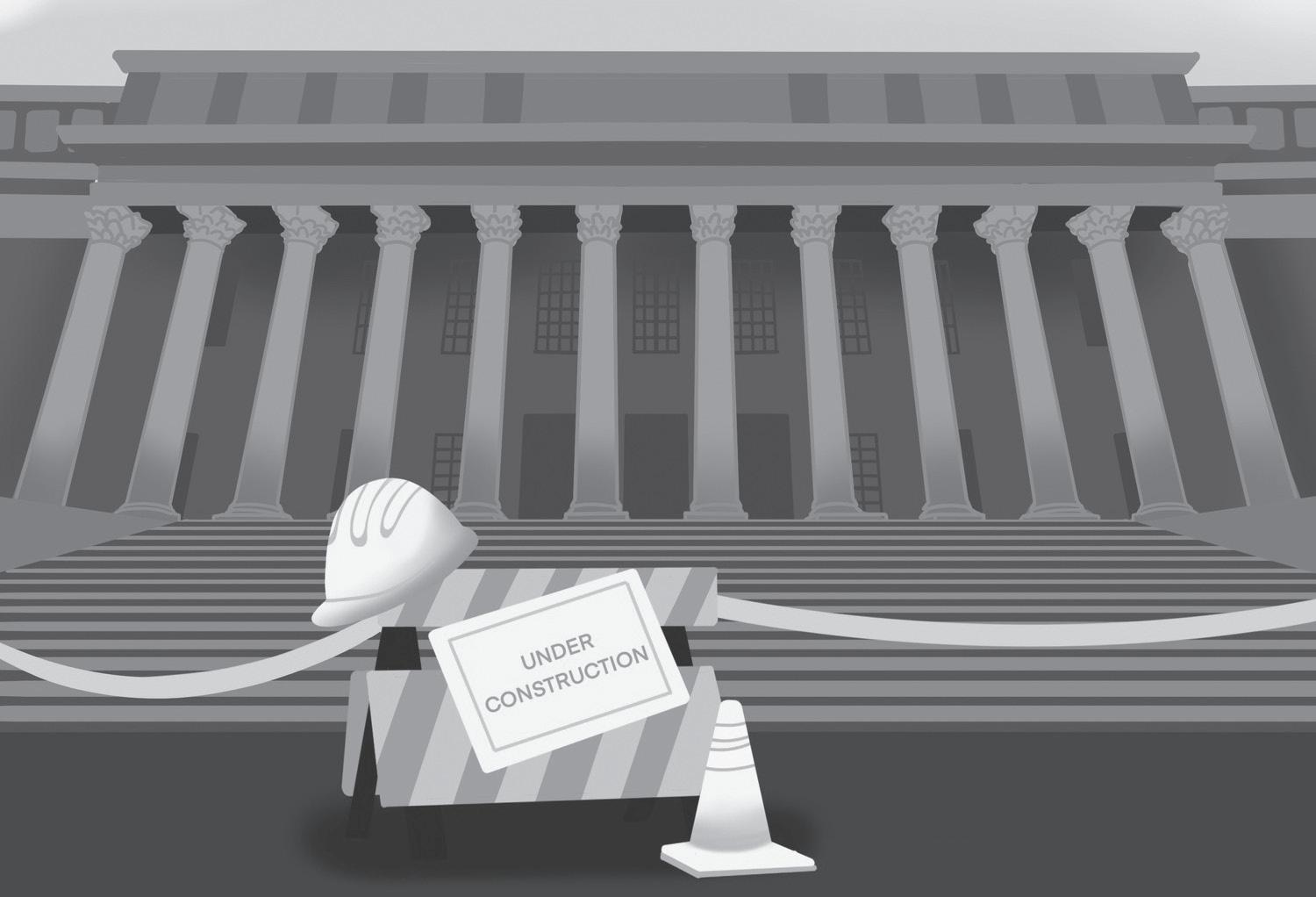
Martha Whitehead, vice president of the Harvard Library, announced plans to renovate the four major libraries in Harvard Yard — Widener, Lamont, Pusey, and Houghton — during a faculty meeting last week.
Whitehead said in an interview on Friday that she hopes the renovations of all four libraries will be complete by Harvard’s 400th anniversary in 2036. “It’s a long term vision,” she said. “The nice thing about it is that as ideas come up, you can sort of test them.”
Whitehead called the broad vision of these renovations “Advancing Open Knowledge” and said that they will create new “points of en-
gagement” for students, faculty, and visitors with the libraries’ collections and resources. The first development to Widener, known as the the heart of Harvard libraries, will be the addition of a publicly accessible “Discovery Center” on the library’s first floor. The new visitor center will include an exhibit on the “history of Harvard,” which Whitehead said will display archival collections such as the map collection currently housed at Pusey Library.
Whitehead said that these changes to the front of Widener will foster a “sense of welcome” to both students and visitors who often excitedly stumble into Widener only to find themselves locked out. “I think it’ll have a completely different feel for this building,” she added.
David F. Elmer ’98, chair of the Classics Department, said he voiced concerns to Whitehead that increased traffic at Widener could be an obstacle to scholarly work.
In a follow-up email, Elmer wrote that “high traffic volumes might also reduce the total ‘output’
of a given space in terms of high-intensity scholarly work, which often requires quiet concentration.”
Public access to Widener will be limited to the front area of the building. Quiet study spaces in Widener such as the Loker Reading Room will remain accessible only to Harvard affiliates.
Whitehead said planning for the renovation is still in the “exploratory stages,” so the earliest students could expect to see any change to Widener’s first floor would be in fall 2025.
A booklet distributed to faculty at last week’s meeting detailed renovation plans and other potential changes in Widener, such as the addition of a cafe or retail shop and the reconfiguration of the third floor as a collaborative work space that promotes “interdisciplinary scholarship.”
The renovation of Lamont will center around improving its aged infrastructure. The library is known among undergraduates for remaining open throughout the school week, leading many students to develop a love-hate relationship with the space.
In the interview, Whitehead said that renovating Lamont is “a first priority phase” due to its importance to undergraduates.
“People love Lamont, and we always see the articles about studying there in the middle of the night,” Whitehead said. “But we also hear a lot just about how it needs some tender loving care.”
The University will increase window lighting in Lamont’s reading rooms and reconfigure them to form a “vertically-integrated” space, according to the booklet distributed to faculty.
The changes to reading rooms and spaces like the Woodbury Poetry Room will offer a more diverse range of “welcoming spaces for individual and collective work and study.”
Another major aspect of the renewal project is the relocation of Harvard’s Fine Arts Library and Collection from the Littauer Center to a collections space in Lamont. Whitehead said students should not worry about access to study spaces while renovations are ongoing.
The changes will be carried out in separate stages and planning is underway to make study locations accessible throughout the process.
The renovations to Pusey, an underground library that contains the Harvard University Archives, will prioritize increasing accessibility to the space and its materials. Projects include making the library accessible by wheelchair, relocating certain collections to Widener, designing a daylit workspace, and creating a space for patrons to consult librarians on digital research methods.
Houghton, which cultivates Harvard’s special collections, was renovated in 2021, but additional renovations will aim to make its materials more accessible.
“We also keep hearing that people would like more opportunities to engage with those wonderful special collections,” Whitehead said. “There’s more that we could do there.” Improvements include creating flexible classrooms and spaces for larger teaching and public events in the library. The University also plans to connect Houghton
to other libraries, like Pusey. Whitehead said that the administration is still working on the capital planning to finance the project and fit it within the FAS and University’s budgets, a large portion of which comes from fundraising. Although the University is currently weathering a donor exodus, Whitehead said that she’d “like to believe that people are still interested in libraries.” Elmer said that he thinks this project is an opportunity to attract donors “who really care about library collections” and spaces. “This is the kind of investment that the value is so very clear,” he said. As plans for this project solidify, one of the biggest challenges will be considering the unique needs of each library. “Different library users have very different needs and styles of working,” Elmer said. “I think that one challenge for this new design phase
expulsion from the Fox and the possibility of him resigning from the HUA. During the talks, Andy Donahue, a DSO administrator who serves as the College’s liaison with the HUA, told the executive officers that Cooke could not be forced to resign. Cooke vowed not to resign from his role at the first meeting with the DSO.
But just three days after Cooke’s expulsion from the Fox, the Harvard Feminist Coalition launched a petition for a vote to recall Cooke from office due to his allegations of misconduct. Within 24 hours, HFC announced that the petition had garnered 527 signatures among undergraduate students, eclipsing the 391 signatures — 20 percent of votes cast in the spring 2023 HUA elections — required to trigger a recall election. After denying multiple interview and comment requests, Cooke broke his silence about the misconduct allegations in the op-ed published on Wednesday — just 12 hours into the campaigning period ahead of the recall election. Cooke’s op-ed marked his first public statement in two weeks. “I’m not worried, and I’m going to stand strong,” Cooke wrote in the op-ed. “I am confident that the truth will prevail.
I am confident that the student body will recognize these rumors as baseless.” On Thursday, Cooke continued to campaign against the

Harvard to Renovate 4 Major Libraries In advance of its 400th anniversary in 2036, Harvard will renovate Widener, Lamont, Pusey, and Houghton libraries. NATALIE Y. ZHANG — CRIMSON DESIGNER NEWS 9 APRIL 12, 2024 THE HARVARD CRIMSON CAMPUS PROJECTS BY NEERAJA S. KUMAR AND ANNABEL M. YU CRIMSON STAFF WRITERS neeraja.kumar@thecrimson.com annabel.yu@thecrimson.com LIBRARIES. Harvard plans to renovate Widener, Lamont, Pusey, and Houghton ahead of 400th anniversary. an election for the vacant position within four weeks. However, the HUA’s next crop of officers will take office in a matter of days on April 20. The downfall of one of the most ubiquitous student government leaders on campus began in late March, when the Fox Club — a single-gender Harvard final club — expelled Cooke as a member over misconduct allegations. Over the next two days, members of the HUA’s executive team held emergency meetings with the Dean of Students Office, in which they discussed Cooke’s
is figuring out how to balance the different kinds of needs.”
recall and posted a story on his public Instagram account imploring students to vote against the effort. “Please take 30 seconds to vote NO in my Recall Election. I really appreciate your support,” the story read. Around 8 p.m. on Thursday, Cooke sent emails to undergraduate students, again encouraging students to vote against his recall. It was not immediately clear how many students received the email from Cooke. Cooke also sent individual text messages to undergraduate students on Thursday with the same request for them to vote against the effort to recall him from office. Cooke’s email campaign appeared to violate the HUA Election Commission’s rules for the recall election. In an email defining rules for the recall election, the Election Commission wrote that the recall election must follow existing HUA election guidelines, which state that “cold emails to individuals as well as campaign texts to organized group chats will be banned.” But the final vote margin ultimately rendered any complaints about Cooke’s campaign impropriety moot. Students Vote Overwhelmingly to Oust Cooke From HUA cam.srivastava@thecrimson.com william.tan@thecrimson.com HUA RECALL FROM PAGE 1 THC Read more at THECRIMSON.COM
EDITORIAL
Refining Interdisciplinarity Studies
BY THE CRIMSON EDITORIAL BOARD
It seems everyone at Harvard believes that interdisciplinarity can be a worthwhile pursuit. Hardly anyone agrees on what that should mean in practice.
In an interview with The Crimson last November, Faculty of Arts and Sciences Dean Hopi E. Hoekstra said one of her goals is to bolster interdisciplinary scholarship and research. Now, recent reporting suggests that faculty are divided on the University’s current approach.
Before interdisciplinarity enters the dictionary of vacuous higher-ed vocabulary (presumably sandwiched between “civil discourse” and “the death of the humanities”), Harvard should be clear about what the term entails — and what it doesn’t.
To our eyes, the University stands at a cross-dis -
ciplinary crossroads. Down one path lies an organic, student-led culture of academic exploration across many fields. Down the other lies an artificial, top-down approach that smashes together disciplines as an end in itself. We favor the former, but some at the University seem intent on pursuing the latter.
Take research as an example. Harvard is home to groundbreaking work on problems that exceed disciplinary confines, like climate change or artificial intelligence. At the same time, many of our University’s brightest minds largely remain within their disciplinary silos, generating fresh insights through novel and innovative applications of traditional methods. An overcommitment to interdisciplinarity can produce research that’s a mile wide but an inch deep.
Harvard is responsible for the difficult job of nurturing the next generation of researchers. It should expose them to the already-vast array of
existing disciplines — not scrape together Franken-classes for the sake of novelty. Thankfully, Harvard doesn’t have to reinvent the wheel in service of interdisciplinarity. An older higher-ed cliché may be the answer: We’re talking about the “liberal arts.” By fully committing to providing a robust foundation in the liberal arts, Harvard can better equip its students to engage in meaningful cross-disciplinary exploration.
Such a change would require students buy in too. Institutional reforms to shore up the place of the liberal arts will fall flat if we continue to squander opportunities to explore by using our General Education courses to take gems or pursuing double or joint concentrations with little value beyond the extra line on our diploma.
And at this point, it almost goes without saying: If Harvard is serious about interdisciplinary learning, it should take the opportunity to establish departments in existing, clearly meritorious areas of cross-field exploration — Ethnic Studies being the obvious example.
Slapping fields together at random isn’t interdisciplinarity. Conflating the two helps neither the University nor the prospects of worthwhile cross-disciplinary inquiry.
–This staff editorial solely represents the majority view of
Of course, the University doesn’t have to sit around hoping students will see the light. Perhaps Harvard could take a page out of Columbia University’s book by requiring students to take robust, manageably rigorous versions of introductory courses like Hum 10, LPS A, Stat 110, and CS50.
topics.
Harvard Must Fight the NAIA’s Trans Woman Athlete Ban
BY E. MATTEO DIAZ AND KRIS KING
Today, the National Association of Intercollegiate Athletics approved an unprecedented ban on the participation of transgender women, in a move that could pressure other major governing bodies of athletics, including the National Collegiate Athletics Association, to follow suit. According to the official press release, “Only NAIA student-athletes whose biological sex is female may participate in NAIA-sponsored female sports.” The policy does not specify how it defines biological sex, nor does it clarify its implications for intersex athletes. It also excludes athletes who have begun “any masculinizing hormone therapy.”
This ban comes amid increased scrutiny over trans bodies in sport and an explosion of anti-trans legislation across the country. To date, at least 24 states have enacted policies restricting transgender participation in sports, 18 of which restrict participation in college sports in particular.
Harsher policies have been on the rise in state legislatures since 2020, but today’s ban appears to be the first of its kind from a national college governing body. Though the NAIA, which includes mostly smaller colleges, is not as large a body as the NCAA, its decision sets a dangerous precedent and could augur a striking shift for collegiate athletics.
The standard for trans athlete participation in college has long been set by the NCAA, which established its first policy in 2011, when it released guidance that allowed students to compete on teams aligned with their gender identity, though it did require one year of testosterone suppression for trans
woman athletes. The policy was updated in 2022, when the NCAA adopted a sport-by-sport approach to determining requirements for participation reflective of the framework used by the International Olympic Committee, an evidence-based approach that centers non-discrimination and the well-being of trans and intersex athletes while recognizing the significant differences between sports.
Compared with the IOC guidelines, the NCAA’s sport-by-sport policy has clear issues, including a lack of safeguards against invasive procedures like genitalia examinations. Still, the policy gives trans athletes a seat at the table and retains the potential for ongoing discussion.
The NAIA’s new ban fails to accomplish even this. The change seems to align with dubious claims that transgender athletes — specifically trans women — have an unconditionally unfair advantage. But this is simply incorrect. A wealth of evidence suggests that testosterone is not a clear or consistent indicator of athletic ability.
Moreover, such a view fails to acknowledge the biological diversity that is inherent to, and even necessary for, sport. Michael Phelps, the winningest Olympian of all time, is frequently celebrated for unique physical characteristics — including a wingspan longer than his height and abnormally low levels of lactic-acid production — that contribute to his success.
Additionally, the impact of certain physical characteristics on performance varies greatly from sport to sport. By regulating all sports as though they are identical, the NAIA’s blanket policy arbitrarily harms trans woman athletes.
Trans people are not arguing for zero regulation, but rather that regulators follow evidence-backed
guidance about fair trans inclusion. While such guidance also creates barriers to trans athlete participation, they at least leave room for trans athletes to compete in the sports they love.
Beyond just the effect of the ban itself, we are deeply concerned that this new ban has been driven by increasing anti-trans pressure, most recently by a lawsuit filed against the NCAA by 16 college athletes. Reka Gyorgy, a former Virginia Tech swimmer and a plaintiff in the case, shares in the opening quote of the lawsuit that she believes her rights were violated after placing seventeenth in an event, behind trans athlete Lia Thomas and fifteen cisgender athletes. But losing a race hardly seems a violation of individual Title IX rights, especially when the alternative is removing transgender athletes from the race entirely — arguably, a clearer infringement on the rights accorded by Title IX.
And, for those who want to support women’s athletics — a laudable, important goal — trans participation is the last place to start.
A report from 2022 found that 50 years after the passage of Title IX, 86 percent of NCAA institutions still offered disproportionately more athletic opportunities to male athletes. In the 2019-2020 academic year, this translated to 58,913 missed opportunities for female athletes. There are many other well-documented threats to women in sports, including sexual abuse, harassment, and unequal access to resources like facilities and coaching.
Looking to Harvard’s Values Statement
BY DANIELLE ALLEN
In late Sept., I joined philosopher Edward J. Hall for a discussion about free speech on campus, under the auspices of the Council for Academic Freedom at Harvard. I was not at the time a member of the Council but joined later in the fall (so scintillating was Ned’s conversation!).
Little did we know, as we chatted genially in Boylston Hall that autumn afternoon, that these very questions would soon convulse Harvard’s campus.
At the time of our panel, I was concerned that our thinking about academic freedom and free speech had become quite muddled. Now as we approach the end of the academic year, I worry that, for all the ferment, our thinking hasn’t made much progress.
So many terms are floating around: “academic freedom,” “free speech,” “civil discourse,” “open inquiry.” I keep hearing from students that they are confused.
In a series of five pieces for The Crimson, I will do my best to name and clarify some of the key concepts needed for the pursuit of high caliber academic and intellectual work at Harvard and on any campus dedicated to open inquiry.
I believe these distinctions are necessary to address our challenges more effectively, and have important policy implications.
Further, appropriate distinctions can help us make sense of — and crystallize our understanding of — the University’s values statement.
Wait, what? A University values statement? You may be wondering if I’m referencing the University’s Statement on Rights and Responsibilities or the College’s mission articulation.
But in reality, Harvard has a little-known enumeration of its University-wide values. Few people know this. In 2016, when the 55 of us — students, staff, and faculty — who served on the Inclusion and Belonging Task Force began our work, we were surprised to learn that a values statement was drafted and passed during the administration of former Harvard President Lawrence H. Summers in 2002.
We lightly revised the Summer’s era statement, received approval for the updated version from then-President Drew Gilpin Faust, and recommended that it be broadly disseminated in our task force’s 2018 report.
But, as with the 2002 declaration, this statement has languished in a few remote corners of campus websites, essentially unknown and unfindable.
So let me introduce you to the Harvard University Statement of Values, the stepchild of our campus policies.
It begins: “Harvard University aspires to provide education and scholarship of the highest quality — to advance the frontiers of knowledge; to equip students, staff, and faculty and academic personnel for fulfilling experiences of life, work, and inclusive leadership in a complex world; and to provide all members of our diverse community with opportunities for growth.”
The Statement continues to argue that achieving these goals requires affirming five values on campus: “respect for the rights, differences, and dignity of others”; “honesty and integrity in all dealings”; “conscientious pursuit of excellence in our work”; “accountability for actions and conduct in the community”; and “responsibility for the bonds and bridges that enable all to grow with and learn from one another.”
The events of this year have put pressure on these values and have also shown us ways in which they are perhaps not strong enough. In addition to respect, people need safety from attacks — both internal and external.
Further, despite the statement’s preamble, it doesn’t name what should be our primary, guiding value: commitment to academic and intellectual inquiry, guided by the highest standards of truth-seeking.
In the pieces that follow, I will describe the principles needed to support this open inquiry.
As I remember it, we learned that there was one copy of the statement displayed on a poster in the basement of Massachusetts Hall. As best as we could tell, that was the only place where the statement then existed. Undaunted, we nonetheless proceeded to embrace the idea that a values statement could help a university orient its sense of purpose and strengthen its work.
Though Harvard may not be a member of the NAIA, it is essential that we make our voices heard during this crucial moment. The University, the Ivy League, and their affiliates should make clear to the NCAA that they will not stand for a similar policy. This ban is not just an affront to transgender athletes, it is an affront to Harvard’s most central values: veritas, diversity, and civil discourse across difference.
We call on Harvard Athletics to publicly reaffirm its commitment to protecting trans+ student-athletes, and the University to ensure trans+ athletes are safe, happy, and welcome at Harvard. We call on cisgender athletes to support their transgender peers in advocacy for their right to play.
Sports are for everyone. Transgender athletes deserve access to life-saving sport spaces, to build community and engage in competition, at all ages and levels. We must keep fighting to defend it. The NAIA’s ban on trans women is abhorrent and unacceptable — we cannot let the NCAA bend to pressure and follow suit. The ball is in our court now, Harvard. We can’t drop it.
team, a club sport not governed by the NCAA.
As trans leaders and a trans athlete, we have witnessed firsthand how anti-trans athletics policies affect trans people’s ability to live our day-to-day lives. We agree that there is a need for conversations, both in research and in the trans community, about fair trans inclusion in athletics. But, by enacting a blanket ban on trans athletes, the NAIA has not created space for conversation — they have shut it down completely. The NAIA is sweepingly denying trans women participation. If that is not the definition of discrimination, what is?

I’ll discuss several key distinctions: distinctions between academic freedom and free speech, between the permissible and the impermissible, between the good and the bad, between the role of the enforcer and of the pastoral teacher, and among our professional, personal, and civic roles. The University’s value statement can help guide our commitment to fostering open inquiry by bearing these distinctions in mind. Perhaps it’s time to update our University’s values statement once more. Perhaps this time the first value should be a steadfast commitment to academic inquiry; the rest of the tenets appropriately support this overarching purpose. And perhaps this time, we could make sure the statement is at last broadly shared. Why not? Third time’s the charm.
THE HARVARD CRIMSON
10 APRIL 12, 2024
STAFF EDITORIAL
The Crimson Editorial Board. It is the product of discussions at regular Editorial Board meetings. In order to ensure the impartiality of our journalism, Crimson editors who choose to opine and vote at these meetings are not involved in the reporting of articles on similar
–E. Matteo Diaz ’27, a Crimson Editorial editor, lives in Grays Hall. Kris King ’24 is a joint concentrator in History of Science and Women and Gender Studies in Kirkland House and competes for Harvard’s curling
OP-ED
OP-ED
piece is the first installment in a series that will identify and assess the difficult ethical questions surfaced by Harvard’s recent leadership crisis.
–Danielle Allen is the James Bryant Conant University Professor at Harvard University and director of the Allen Lab for Democracy Renovation. This
JULIAN J. GIORDANO — CRIMSON PHOTOGRAPHER
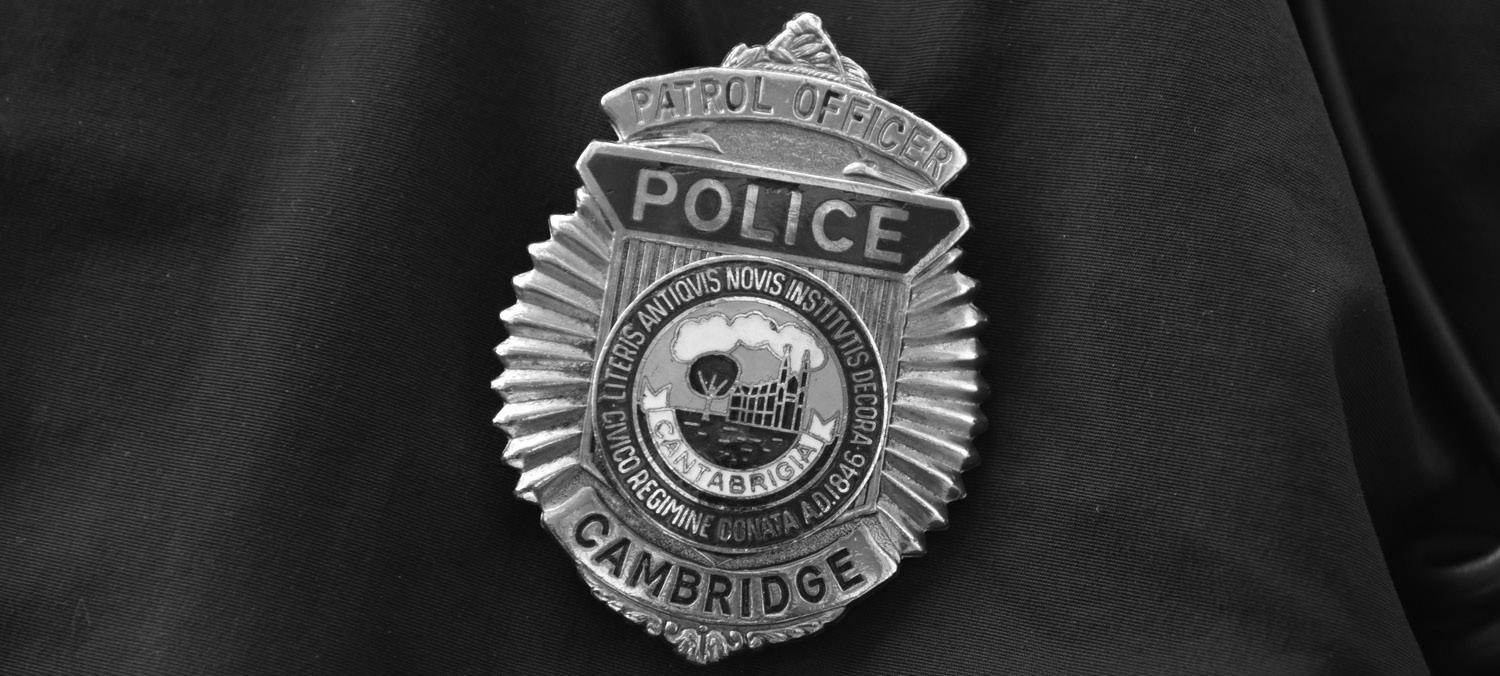
On Jan. 4, 2023, Officer Liam McMahon of the Cambridge Police Department shot and killed 20-year-old college student Sayed Faisal — the first fatal police shooting in the city in 20 years. Only three years after the nation was rocked by the police killing of George Floyd, Faisal’s killing catalyzed a resurgence of anti-police protests in Cambridge as activists demanded department transparency, institutional reforms, and policing alternatives.
In response, CPD committed to a slate of reforms. In the last month, the department announced plans for a co-responder program, promised body cameras by next fiscal year, and continues to institute less-lethal tactics into its policing.
Some activists, however, have lost trust in the department entirely, and are advocating for non-police response alternatives.
As the community-based Holistic Emergency Alternative Response Team — which refuses to affiliate with CPD — struggles to secure a contract with the city, Cambridge is rolling out its own alternative: the Community Assistance Response and Engagement Team, which imagines itself as a partner to the department.
The heads of both teams have promised that they will complement each other, suggesting that two police alternatives is better than one.
But as CARE moves ahead while HEART lags behind, some advocates said they worry the former’s connection to CPD will prove ineffective in addressing the circumstances that led to Faisal’s death — and could compromise efforts to reimagine Cambridge’s approach to policing overall.
‘So Much Progress’ A month after Faisal’s death, in Feb-
ruary 2023, CPD and Cambridge City Manager Yi-An Huang ’05 — buffeted by protests and demands from local activists — pledged reform. Huang promised to equip CPD with body cameras, fund an alternative emergency response team, and look into less-lethal weapons for CPD officers. Weeks later, CPD commissioned the Police Executive Research Form to lead an independent, external review into a department. Since then, PERF released two reports reviewing the department, both including extensive recommendations for the adoption of body cameras. After more than a year of promises and assurances that CPD was on track to implementing the technology, the department committed to adopting body-worn cameras in 2025.
“We’re going through this tragedy wanting to bring in all the resources we possibly can to do everything we possibly can to avoid something like this from happening again,” CPD commissioner Christine A. Elow said during a March meeting of the Cambridge City Council’s Public Safety Committee. But despite efforts towards improvement, some Cambridge activists, scholars, and politicians say the reforms don’t go far enough.
Former Councilor Quinton Y. Zondervan said body cameras are insufficient to ensure safety and accountability.
“I personally do not support body cameras — and I voted against it as well — because the problem is that when we look at the data, there’s no positive impact,” he said.
“Body cameras on police essentially confirm that we want them to continue to police as they currently do.” “Body cameras don’t help anything, and they just cost more money and create additional bureaucracy,” he added.
Instead of the body-worn cameras, Zondervan — who served the Council when Faisal was shot and did not run for reelection in 2023 — said he would like to see disarm-based reforms from CPD. “They need to disarm,” he said. “They need to shift their approach from going to war against people and justifying using weapons against them to caring about people and preventing violence.”
Following the PERF report, CPD also instituted additional training on the deployment of less-lethal launchers and has announced plans for a co-response program — in which a social worker will respond to mental health calls alongside the normally-dispatched Cambridge police.
CPD spokesperson Robert Goulston wrote that the department continues to pursue “innovative ways” to promote accountability in the city’s “extremely complex and uncertain” policing environment. “We have made so much progress on police reform by adding more layers of oversight, new processes, tools, and technology and strengthening what is already working,” he wrote.
But Party for Socialism and Liberation organizer Tahmid Rahman, who worked to organize protests following Faisal’s killing, said he has lost trust in an armed police force to ethically maintain public safety.
Instead, he said Cambridge needs “alternative measures” to keep the city safe.
“What we need to do is minimize police interactions with civilians, and instead, rely a lot more on community-based programs — and get to a point where we can confidently say, ‘We The People’ keep us safe,” he said.
‘Tools on the Toolbelt’
Even before Faisal’s killing, Cambridge had made concerted efforts to mobilize unarmed police alternatives in the city.
After George Floyd’s murder in 2020, Cambridge residents approached the Cambridge City Council with a proposal for an independent, community-based police alternative — rather than an organization within the city itself.
The proposal evolved into Cambridge HEART, which Zondervan developed alongside a group of residents.
At the same time, the Council passed a policy order asking thencity manager Louis A. DePasquale to investigate alternative policing options. DePasquale convened a task force, which proposed the creation of the Community Safety Department — the city’s official

launching point for non-police response programs.
By January 2022, the Council was weighing both options — one, an internal city department that would work alongside CPD, and another, an independent community organization that refused to do so.
In March of 2023, councilors passed a policy order calling for Huang to fund HEART and negotiate a contract with the organization — launching a year of protracted, and ongoing, negotiations.
At the same time, Huang designated CSD as an independent department within the city. Last September, CSD hired a team of responders, officially forming the Community Assistance Response and Engagement team.
As HEART struggled for recognition and support, the city was swiftly moving forward with its internal option.
CARE plans to respond to 9-11 calls “very shortly,” according to CSD executive director Elizabeth Speakman. The team will respond to wellness checks and mental health calls with no medical or safety issues, alongside the needle pickups that began in late February. The team will also respond to “unwanted person calls,” according to Speakman.
“The goal is to help them meet their needs and get to the root cause of what’s happening to them that they’re in this situation, rather than punishing them for probably something that has to do with poverty, or mental health, or substance use,” Speakman said.
Cambridge Police Officers Francis L. Gutoski and William Simmons, Jr., who are stationed in Central Square, said they brought the CARE team on a walk-a-long to introduce them to some of the residents and orient them to the area. Gutoski said he believes CPD officers and CARE will rely on one another to provide the necessary services to Cambridge’s unhoused population.
“They’re going to lean on us, and we’re also going to lean on them,” he said. Simmons said that he and Gutoski are often relied on for problems in the community that they may not be best suited to respond to, including aiding unhoused people with mental health issues. He sees CARE
as more “tools on the toolbelt” to provide services to whoever needs help. While many Cambridge residents and activists see CARE as a step in the right direction, others are concerned with the team’s underlying connection to the police force.
Boston University professor Spencer Piston said he does not believe the CARE team will be effective in mitigating police killings — especially in cases like Faisal’s — as dispatchers will not send the CARE responders to situations in which a weapon is present.
“The problem is the team that they’re creating, this Community Safety Department,w would not have responded to Sayed Faisal’s case,” he said. “Because he was holding — supposedly, police claim — he was holding a weapon, any socalled alternative to policing run by the city government would go out the window,” Piston said. Jeremy C. Warnick, a spokesperson for the city, said that the policy’s intention is to keep the unarmed responders safe from harm.
“Employee safety is of the utmost importance to the City,” Warnick wrote in a statement to The Crimson. “Ensuring a safe work environment not only protects employees but also contributes to the overall well-being of the community.”
‘A Different Path’
As CARE begins to roll out its services in Cambridge, HEART offers residents non-emergency support through an email hotline. The organization — which is currently scrambling to find a new home base — also provides longer-term support for residents struggling with mental health, housing, or financial problems.
However, since the organization’s founding — and despite the Council’s request in March 2023 to provide city support for the group — HEART has continued to struggle to receive a contract with the city.
Zondervan said that he believes HEART was “strung along” by the city, which then set up the CSD’s “competing program.”
“It’s fine for both programs to exist, and I hope that they will both
be extremely successful,” Zondervan said. “But there’s an alternative universe where the city could have embraced HEART from the beginning, and funded them and supported them much more extensively so that they could be assisting our residents.”
HEART co-director Corinne Espinoza said the organization currently employs nine staff members and works with a network of volunteers to provide a community-based policing alternative. Espinoza added that HEART’s commitment to “self-determination” distinguishes the group from other alternatives. As an independent organization, HEART is committed to not involving law enforcement or government agencies unless directly requested to do so by the person needing assistance.
“There are always going to be some people who will never call the city, regardless of how dire their situation is,” Espinoza said. “We’re a really good choice for that person.” Zondervan said that the organization provides a necessary service that isn’t provided by the city.
“The reality is that some people will not be served by those other programs, either because they don’t want to interact with the city government so directly, or because the government simply is unable to help them,” he said. Speakman objected to the notion that there needs to be a choice between CARE and HEART. She said she looks forward to working with HEART to provide more resources for Cambridge residents. “This is not a competition of who we should be doing this instead of anyone else,” she said. “It’s really
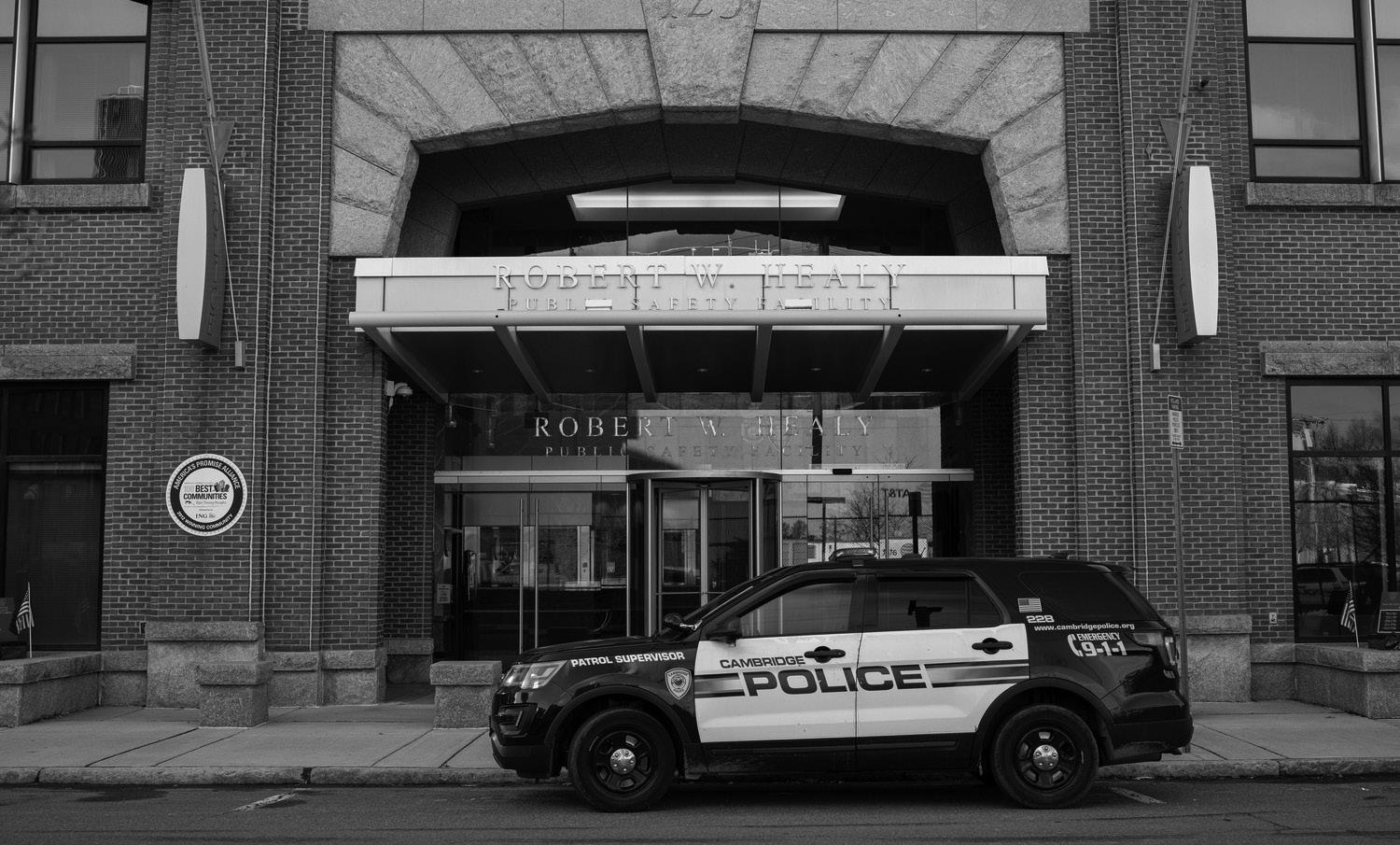
complimentary
Espinosa agreed
both CARE and HEART can
together to support the Cambridge community and
“there’s room for both organizations” in Cambridge. “There’s plenty of people struggling, unfortunately, who will need a different path, and so making sure that we’re providing as many options for people to find the right path as possible,” Speakman said. “That’s just one of the really beautiful things about Cambridge.” How Cambridge Is Reimaging Policing Cambridge’s two unarmed police alternatives — CARE, which works in partnership with police, and HEART, which refuses to do so — are still figuring out how to co-exist. ISABEL M. KENDALL — CRIMSON PHOTOGRAPHER METRO 11 APRIL 12, 2024 THE HARVARD CRIMSON CAMBRIDGE POLICE DEPARTMENT BY SALLY E. EDWARDS AND ASHER J. MONTGOMERY CRIMSON STAFF WRITERS sally.edwards@thecrimson.com asher.montgomery@thecrimson.com PUBLIC SAFETY. Following the police shooting of Sayed Faisal, CPD pledged to reform. Some activists say it wasn’t enough. Four Cambridge Police Department officers watched people protesting the shooting of Sayed Faisal from across the street in March 2023. RYAN H. DOAN-NGUYEN — CRIMSON PHOTOGRAPHER A Cambridge Police car sits parked in front of the Robert W. Healy Public Safety Facility at 125 6th St. JINA H. CHOE — CRIMSON PHOTOGRAPHER
the option for the opportunity for
services.”
that
work
said that

Olivia Rodrigo Concert Review: A Moving Night
Olivia Rodrigo is not just a musician and songwriter — she’s a performer. Stopping in Boston on April 2 as part of the ‘GUTS’ World Tour, she delivered an astonishing show, from dynamic visuals and choreography to the heartfelt lyrics, unreal sound, and touching moments of connection with the audience.
Opening with “bad idea right?,” Rodrigo started off the concert with a burst of energy. Bathed in flashing blue and red lights, Rodrigo bounced around the butterfly-shaped stage, singing, “I only see him as a friend / the biggest lie I ever said” before her band played a gorgeous rock guitar riff, embodying the song’s carefree theme and building excitement for other pop-rock tracks in the set.
Walking onto the stage behind a backdrop of yearbookesque photo frames spotlighting Rodrigo and her band, she moved on to the pop-punk inspired song “ballad of a homeschooled girl.” Full of angst, the track details social blunders like “I laughed with the wrong time, sat with the wrong guy” and other embarrassing missteps. Drummer Hayley Brownell’s powerful instrumentals alongside Rodrigo’s relatable lyrics
conveyed the song’s message of letting go of the frustration that comes with social faux pas and embracing the slip-ups. Rodrigo followed with the lead single off “GUTS,” “vampire.”
An emotional track about a onesided relationship, the song’s lyrics shone through Rodrigo’s passionate delivery and the fitting image of her silhouette in front of a full moon. “vampire” kicked off the more melodic portion of the set, with “traitor,” “drivers license,” and “teenage dream” following, which highlighted Rodrigo’s poignant lyricism and touching relatability. “I wrote this next song a few days before my nineteenth birthday, at a time when I was so afraid of growing up and just dreaded every birthday. I thought growing up was the scariest thing,” Rodrigo said when introducing “teenage dream.” Now 21, Rodrigo reflected on the joys of growing up and gave voice to her fears, while also becoming one of the people that says “it gets better the more you grow” from “teenage dream” — adding a new dimension to the nostalgic track. “pretty isn’t pretty” stood out as another highlight, from the expert choreography to the song’s focus on burdensome feminine physical expectations. Surrounded by her backup dancers holding up mirrors emblematic of lollipops, Rodrigo sang, “I started to skip lunch, stopped eatin’ cake
enough to
of
the
the piece features a slanted panel constructed in the form of a wall. With a cut-out archway through which visitors can walk, the piece dominates the room with its impressive size and eye-catching colors. Báez’s capacity for subtle yet cutting symbolism is also put on display, as faded images that appear on the panel as wallpaper eventually reveal themselves to be recurring motifs of oppression and resistance. In the next room, viewers are treated to a collection of some of Báez’s early power pieces — including “Can I Pass? Introducing the Paper Bag to the Fan Test for the Month of July,” a series of daily self-portraits from various angles. Rather than render her likeness in a life-like manner, Báez paints in broad strokes of light brown gouache that offer only a silhouette of her face — save for the richly detailed, piercing eyes that adorn each painting,
on birthdays / I bought a new prescription to try and stay calm.” Rodrigo’s dancers held up the mirrors to their faces and danced with them before thrusting them towards her, emphasizing not only how common it is to magnify one’s imperfections, but also how often physical standards of beauty are imposed on women. A notable moment of connection during the show was Rodrigo’s performance of “logical” from a moon platform suspended in the air. As the glowing purple crescent moon gradually spun across the stadium, Rodrigo looked out at fans up above in the recesses of the venue as she sang, “I look so stupid thinkin’ / two plus two equals five,” making sure that all of her fans felt included in the concert. Though the floating moon may appear gimmicky, its inclusion during the melodious portion of the set fostered tender and intimate moments that can be difficult to achieve on a stadium tour.
“Can’t Catch Me Now,” written for the 2023 film “The Hunger Games: The Ballad of Songbirds and Snakes,” was another standout track in the set, and the instrumentals died down to center Rodrigo’s vocals and the vocals of her backup singers. The vengeful retribution at the heart of the song was evident from the stripped-back sound and limited choreography, calling attention to the track’s anthemic tension. Rodrigo made sure to in-
each seeming to follow the viewer around the space. The work places itself in conversation with two problematic and prejudiced trends from history, such as the paper bag test — a racist practice wherein Black Americans faced discrimination based on whether or not their skin tone was lighter than the color of a brown paper bag. Even early in her career, Báez shows an astounding capacity to present artworks that are at once beautiful and biting. Further in the galleries, Báez’s mastery over countless different mediums is displayed in the installation work “Man Without a Country (aka anthropophagist wading in the Artibonite River).” As the viewer approaches, what at first appear to be a number of miniature paintings hanging a few inches in front of a wall reveal themselves to be pages torn from countless deaccessioned books. On top, Báez has painted wild, colorful forms that themat-
clude songs off her debut album “SOUR” in the set as well. Sitting on the edge of the stage with guitarist Daisy Spencer, Rodrigo shared the experience of posting the song “happier” online — her first introduction to producer Dan Nigro. “I posted a clip of it on my Instagram. I remember being so insecure. I thought it got no Instagram likes, and everybody hated it. I was like, ‘Ah, why’d I ever post it?’ But it turns out one very important person liked it. That was this producer, Dan,” Rodrigo said. Towards the end of the set, Rodrigo returned to her fiery punk-rock tracks. The introduction to “brutal” was especially exciting, as Rodrigo’s band played the song’s instrumentals against a backdrop of a burning purple curtain. Emily Rosenfield and Spencer on guitar, and Moa Munoz on the bass, played lush riffs alongside Brownell’s rich drumline — fitting for the song’s theme of angsty teenage rage. Rodrigo yelled out, “And they’d all be so disappointed / Cause who am I if not exploited” before holding her hands out to the crowd, encouraging them to sing along and feel all of their teenage rage. From bouncing across the stage with her band to playing air guitar and headbanging, Rodrigo’s rendition of “brutal” was playful and full of feeling, embracing her youth while singing about all of its agonizing challenges.
ically interact with each other and with the text they cover. The fullest extent of Báez’s multimedia talent is highlighted in the exhibition’s two installation rooms. Of particular note is “A Drexcyen chronocommons (To win the war you fought it sideways),” an ethereal space that is meant to evoke ocean waters deep below the waves — a goal it achieves to spectacular effect. Shredded cloth undulates above as golden lights shine from hidden corners, filling the space with a warm, Atlantean glow speckled with radiant dots that peak through holes in the textiles. Plants frame stunning paintings of matriarchal figures, referencing the story of “Drexciya,” an aquatic kingdom populated by the persevering children of pregnant women violently cast or forced overboard during the slave trade. Once again, Báez demonstrates her astonishing talent for breathtaking, striking
“all-american bitch” continued this trend, focusing on the contradictions that are a part of womanhood. As Rodrigo sang out, “I’m a perfect all-american bitch / with perfect all-american lips / and perfect all-american tits,” a pair of bright red lips sang along behind her, illuminating the contradictory reality of being a woman — of being expected to feel nothing yet feel grateful, and to be pretty, yet sexy, yet also classy. The final song of the set and the second of two encores, “get him back!,” was a beautiful end to Rodrigo’s performance. Balancing the yearning to get back together with an ex alongside the desire to get revenge and move on, Rodrigo sang into a red megaphone, “I wanna get him back / I wanna make him really jealous, wanna make him feel bad.” Playing up the song’s range of emotion, Rodrigo’s vocal delivery aptly portrayed the humor, anger, and heartbreak within the track, ending the concert on a thrilling note as purple and blue star-shaped confetti rained down on TD Garden. Rodrigo’s performance was captivating, featuring a variety of sonic textures, detailed choreography, passionate vocals, and stunning visual backdrops. Rodrigo spilled her guts in Boston, and her pop stardom is sure to bring her back soon.
aesthetic experiences that simultaneously probe historical tensions. All of Báez’s art is defined by her incisive commentary and amazing use of color and form. Every work in the exhibition, regardless of scale, date, or content, is a vibrantly creative visual delight. Complete mastery of both innovative techniques as well as traditional modes of painting ensure that every work is fresh and memorable. Equally impressive is Báez’s immense historical knowledge — both social and artistic — that she continually wields to striking effect. Though the curation often fades into the background in this show, it is precisely for this reason that it is so worth celebrating. White walls and bright yet
APRIL 12, 2024 THE HARVARD CRIMSON ARTS 12
STAFF WRITER
COURTESY OF ANNA MOISEIEVA MUSIC The first survey exhibition of Firelei Báez’s work in the U.S. is currently on display at the Institute of Contemporary Art in Boston from April 6 through Sept. 2. In a breathtaking explosion of color, historically grounded artworks explore the tense histo
ry of colonialism and diaspora.
rich, yet still young, career while never failing to deliver a captivating aesthetic experience. From the moment viewers enter the galleries, they are immediately confronted with the might and grandeur of Báez’s vibrant and monumental style in her piece titled,
title
BY ANNA MOISEIEVA CRIMSON
anna.moiseieva@thecrimson.com
-
Organized chronologically, the exhibition does an outstanding job of offering insight into Báez’s
“(once we have torn shit down, we will inevitably see more and see differently and feel a new sense of wanting and being and becoming).” With a
long
match
ambition
the work itself,
illuminate
paint —
in
befits a
like Firelei Báez. Nothing in the room can draw attention away from the emerging master’s talent, commentary, and sheer presence in her art. The ICA’s newly opened survey exhibition is an absolute must-see for any museumgoer of any background. Artists, historians, and even the entirely unfamiliar will find themselves enamored with Báez’s colors and compositions, wholly immersed thanks to the thoughtful curation of Eva Respini, the deputy director and director of curatorial programs at Vancouver Art Gallery and former chief curator at the ICA/Boston, with curatorial assistant Tessa Bachi Haas. ‘Firelei Báez’ Review: Explosive Color, Cutting Commentary BY JOHN M. WEAVER CRIMSON STAFF WRITER john.weaver@thecrimson.com
unobtrusive lighting allow each work to stand out, not obscuring or distracting from any detail. The lighting is particularly effective, as it manages to
each piece — even those made with oil
without smothering swathes of the composition
lurid glares. The inconspicuous approach to design is exactly what
striking young artist
You’re invited to apply for our open Summer 2025 internship opportunities in:
• Discretionary Investing
• Strategy & Business Development
Internships
Our internships are open to students from all academic backgrounds who want to build skills and relationships, work on high-impact initiatives, and learn about investing and technology development from experts inside and outside the rm.
Check back after May 29 for Summer 2025 internship opportunities in Business Operations, Systematic Investing, and Systems.

Learn more at campus.deshaw.com
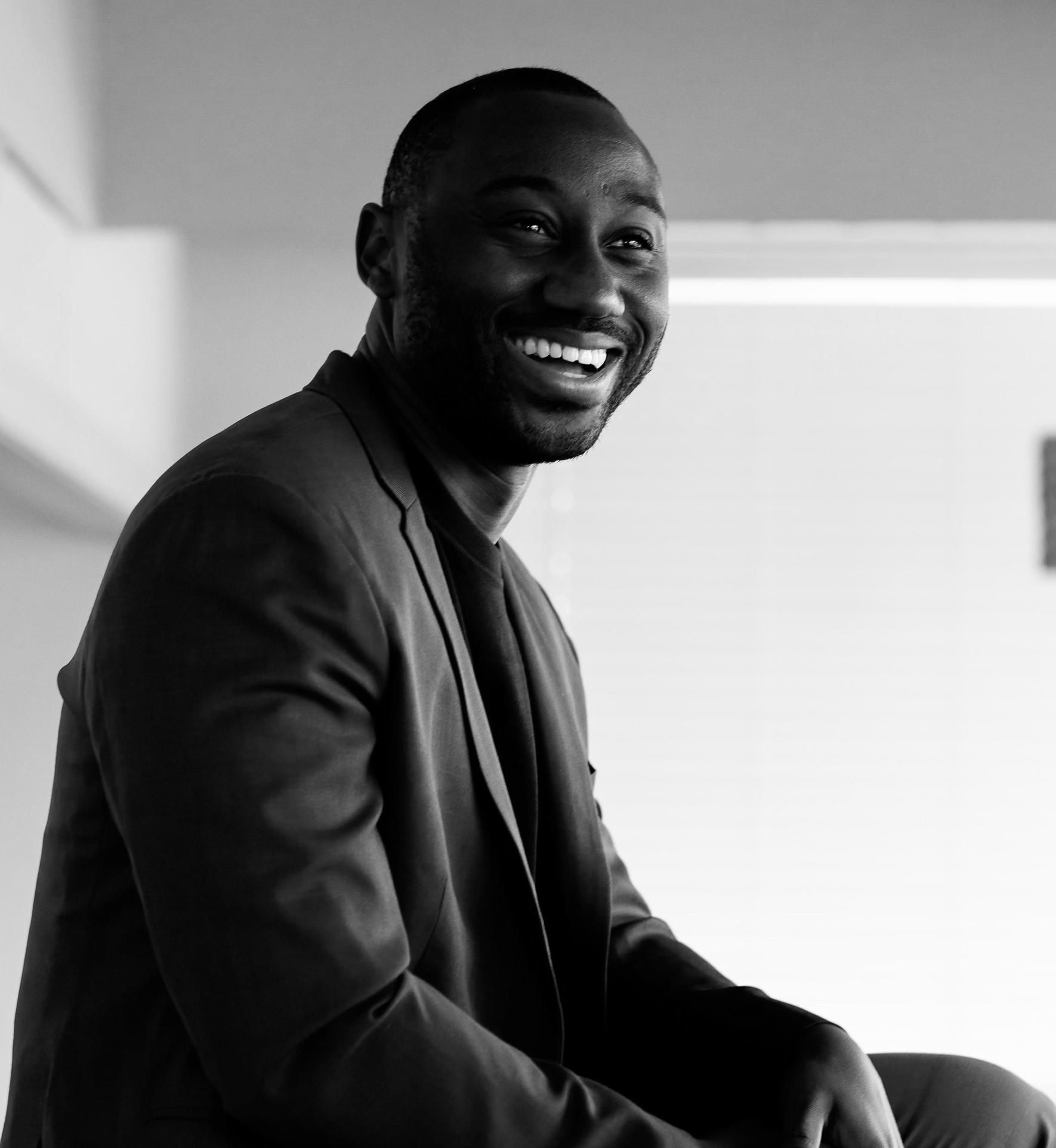
The first thing Kwesi J. James did after agreeing to be interviewed for a profile was ask me — his interviewer — a question: “Who’s your favorite person to interview?” Producer, internet personality, and world traveler, James has always steered away from the norm — of course when he was supposed to answer questions, he asked one.
“I’m not good at anything,” James said in an interview with The Harvard Crimson. Regardless of whether that statement is true or not, James’s quest for knowledge and experience remains untempered. With an ambitious yet generous approach to life, he doesn’t take no for an answer and would give nearly anything in the world a try — particularly in his role as a frequent guest star on The Try Guys YouTube channel. “Luckily, with The Try Guys, we’re trying things,” James said. “Throughout my life, I had to be comfortable with just getting a lot of things wrong. And that makes great comedy.” The premise of much of James’s work is how open he is
to trying and failing at anything — from cooking with a Michelin star chef to competing against a Scrabble World Champion. Since “professional trier” isn’t exactly a job title, James tends to tell people that he’s a producer, especially when talking to his Carribean family and older generations who have limited exposure to internet media. “Outside of Hollywood, no one knows what a producer does. But they know a producer does something,” James said, laughing. “I produce something, right? I produce laughs. I produce content.”
Clearly this definition is sufficient for James’s mother, who brags about James to her family to his evident delight. “I was searching for that validation from my parents,” James said with a grin. “I was the kid who felt like I was behind my whole life. I have dyslexia — I didn’t know until I got into college. So for the majority of my life, it was like, ‘Kwesi needs extra time on everything.’”
His experience “working from behind” and “not being the fastest or smartest” translates perfectly to his current job of trying and failing at things professionally. This well-suited career path is no coincidence, though. “I’m willing to try cool things
The script uses small moments to showcase Rostov’s knowledge, such as when he recognizes the musical note from his attic bed creaking, or when he identifies the spices used in his dinner through taste alone. Even though party officials constantly and silently observe him inside the hotel, Rostov appears strong and determined in the premiere, intent on never letting himself falter. Internally disturbed yet externally confident, this complex character comes to life through an exceptional performance by Ewan McGregor. As shots stay focused on his face, the actor manages to exhibit the conflicting feelings inside Rostov, coming off as both powerful and emotionally affecting. Through shaky motions, the camera shadows Rostov too, becoming a visual representation of his crumbling reality. Rostov’s present day is con-
that people who are smarter, faster, or better may not.”
He acknowledged that more visibly successful people are often more afraid of failure. Since he wasn’t the quickest along the traditional path, he grew to be resourceful and resilient instead.
“I had to learn how to go around doors,” James said. “How do I sneak through the window? To get in and get what I want, you know, and to live a cool, fulfilled life.”
A cool, fulfilled life isn’t easy to come by — and certainly not with the life circumstances that James was dealt. After living in Brooklyn and experiencing violence in his early life, he moved to Florida with his family and attended high school there, where he often skipped class and was ultimately expelled. Regardless, James still set his sights on film school. “I went to this film school where if you have a student loan and you can open a door, you can get in,” James said. “I worked my ass off to try to learn as much as possible about this film industry.” Soon after, James made his way to L.A., eager to try his hand at the industry.
“It was the worst time to find a job in Los Angeles; it was 2008,” James said. He was living with
trasted with flashbacks from his past and childhood. In these scenes, the show’s aspect ratio changes to square shots filmed under a grainy, vintage filter. The memories contain little di-
alogue and allude to past relationships, which are both idyllic and disturbing. The use of flashbacks efficiently plants secrets and storylines for discovery as the show progresses. At the same time, Rostov’s memories present a hidden facet of an otherwise amiable and respectful man.
his friends from film school at the time and knew, despite the tumultuous job market, that he owed it to himself to give the film world a “Kwesi James Try.” He put on his graduation suit — “the only suit that I had” — shipped his car from Florida to Los Angeles, and picked three L.A.-based production companies that had been ignoring his emails to visit in person and ask for a job.
“The first place I went to was a company called DNA,” James said. “I went in. I sat down. I named every director on their roster, and every single music video they shot — because I’d studied it. And she was like, ‘When do you want to start?’” After DNA, James worked at BuzzFeed at the same time as other famous media personalities such as Quinta Brunson, Eugene Lee Yang, Zach Kornfeld, and Keith Habersberger. However, James was ultimately laid off. He eventually found his way back to the now-independent Try Guys, who he had worked with in his time at BuzzFeed. Currently James stars in many of their videos, while still working on other external projects. Perhaps no one can sum up James’s approach to his life circumstances better than himself: “I’m not the fastest. I’m not the best. But man, I got some gump -
McGregor is supported by various worthy performances in the premiere. Paul Ready stars as a fallen Russian prince, whose completed arc in the first episode tugs at the viewer’s heartstrings and reminds the audience of the violence present in Rostov’s time. Newcomer Alexa Goodall plays the inquisitive and playful Nina Kulikova, a young girl fascinated by royalty and Rostov’s past, whose relationship with the latter will likely develop in the following episodes.
tion in me.” An exceptional thing about James — one that even he didn’t directly acknowledge in his interview — is his steadfast self-direction. It’s hard not to marvel at his journey, at how confidently he depletes his energy to “try to accomplish dream[s] that I have,” and how he seems to know intuitively the next best move he should make to elevate his life.
“For me, it really feels like breathing. Like, do you think about breathing?” James said. “The only time when you feel like it’s really hard to breathe is when something is suffocating you.”
James paused, taking a breath himself. “I’m not the best at school. I don’t think I’d be really that good if I worked in a cubicle. But performing with The Try Guys, creating videos, feels like breathing. It’s that natural.”
James’s natural gift of creativity and his experience-honed tenacity to change his circumstances are exactly what pushed him from the well-trodden path of mediocrity towards one of true excellence — both as a producer and as a human being. In that way, he is more than just the “good at anything” label that he denies himself: James is
However, there is some disconnect between the performances and the show’s setting. The actors all have British accents, and, while that may contribute to the posh and historical feel, it makes it difficult to remember the show is set in Russia. Still, the accents don’t take away from an engaging and competent cast. “A Master of Circumstance” presents the case for a familiar premise: a period drama similar to many beloved BBC shows, such as “Parade’s End” and “North & South.” Well-produced and visibly high-quality, the episode pays special attention to establishing the atmosphere of the series and its main setting — the magnificent Metropol Hotel. Rooms and halls are lavishly decorated, and the classical soundtrack is efficiently utilized to bring gravity to different scenes.
Just shy of fifty minutes,
ambitiously excellent. KWESI JAMES, ARTIST PROFILE BY STELLA A. GILBERT CRIMSON STAFF WRITER THE HARVARD CRIMSON ARTS 14 stella.gilbert@thecrimson.com COURTESY OF HANNA YAMAMOTO ‘A Gentleman in Moscow’ Premiere Review: ‘Engaging’ APRIL 12, 2024 “A Gentleman in Moscow” is a unique story of survival, set in a luxurious hotel. Adapted from the 2016 novel of the same name by Amor Towles, the series follows Count Alexander Rostov (Ewan McGregor) and his house arrest in the Metropol Hotel following the Russian October Revolution of 1917. The Paramount+ limited series’s premiere episode, “A Master of Circumstance,” is a touching and engaging beginning that cements a star performance from its lead and raises expectations for growing supporting storylines. “A Master of Circumstance” does one thing exceptionally well: building its main
ter, Count Rostov. The
is
master
he
charac-
aristocrat
a
of the arts and fine dining, yet
finds himself unwelcomed by a changing society.
the premiere is an immersive origin story that can rightfully stand as a complete film on its own. The first episode of “A Gentleman in Moscow” is a tale of adaptation, an attempt at stability during a tumultuous turn of events inside a gilded cage. Rostov voices the show’s message early in the premiere: “They can take away your house or your rooms. They can’t take away who you are.” McGregor’s sweeping performance ties together the historical and emotional elements of the show, making a grand, foreign setting seem manageable. “A Gentleman in Moscow” is a show to watch out for, setting high stakes for its characters. Viewers can anticipate spending many enjoyable evenings in the Metropol Hotel. BY ERLISA DEMNERI CRIMSON STAFF WRITER erlisa.demneri@thecrimson.com Internally disturbed yet externally confident, this complex character comes to life through an exceptional performance by Ewan McGregor.
PROFESSIONAL TRIER, IS
GOOD AT ANYTHING’
“
‘NOT
to think about what happened in
but realize it was a dif ferent context. The people were different. The time was different. Understanding the legacies from the past, but not to let it hold you in place. You’ve got to move forward.
FM: Your most recent book, “On Juneteenth,” grappled with the history of your home state of Texas. Texas students learn about the state’s history in fourth and seventh grade. Given the chance, how would you revise their curriculum?
AGR: Well, I would be much more upfront about all of the people who existed in Texas before. It started out as a place with indigenous people. And then there were people from the Spanish Empire, people of African descent, Anglo-Ameri cans — people who became An glo-Americans. I would also talk about the institution of slavery and how that helped make the place. A lot of people came there be cause they wanted to be a part of the cotton empire. I would imagine that his tory teaches that to a de gree today, much more so than it did when I was a young person. But I would make sure that that understand ing about the history of Texas was put for ward, clearly.
FM: In 2022, Con roe Independent School District — the district you grew up in — named a new ele mentary school after you. What was your reac tion to this?
AGR: They had been asking me about this for a couple of years beforehand, and I had declined, because I was sort of hesitant about naming things after people who are still alive. But my husband convinced me that my parents’ friends who were still living — my parents are no longer living, but some of their friends are still alive — would be very happy to see that take place. So I said, “sure.” And it was great. I went down for the opening. And I went back again later on for the first graduation. It just made me very proud.
in history. I think we’re probably going to get some historians out of that.
FM: You have pushed back on the argument that Sally Hemings completely lacked agency in her relationship with Thomas Jefferson. Given that Hemings was enslaved by Jefferson, is there still value in framing her relationship with him in terms of choice?
AGR: That was the way her son described her decision to come back from Paris with Jefferson. Once she comes back to Virginia, she’s completely under his control. And so all of the strictures, all of the power that enslavers had over the enslaved, come into


FM: In the 2022-2023 school year, that same school district banned 59 books, more than any other in the Greater Houston area. Critics have noted that many of these banned books highlighted the stories of underrepresented communities. How do you feel about having an elementary school named after you in a district that some see as hostile to marginalized voices?
AGR: I grew up in that place, and I’ve always understood that it’s a tough place. It’s always been tough racially. There were lynchings in that area in the early 20th century, and I don’t expect it to have risen above all of the racial problems that were brought on by slavery and Jim Crow and
segregation. So it doesn’t surprise me. It makes me sad, because I grew up at a time when going to the library in school and the public library was a liberating thing. I read widely. There were books that you sometimes had to get your parents’ permission to read — it was not a total free for all — but the idea of banning books just strikes me as really unfortunate.
FM: Is there anything about Conroe you miss while you’re in Cambridge?
ELG: I miss the small town feeling, the ease. You miss childhood, and in missing childhood, I miss, obviously, my family, my parents, who are no longer living. But the main thing is, I miss the smallness of it. The relaxed part of it, I should say.
FM: You’re a professor in the Department of History and at the Law School. How do history and the law inform one another in your work?
AGR: Both of the disciplines require
attention to the idea of evidence, and sources, and stories, and logic. In our legal system, we rely on precedent, which requires you to look to the past to find answers to current day problems. So I think they work very, very well together as a discipline.
FM: As a constitutional scholar and a historian of one of America’s most prominent Founding Fathers, what do you see as the value of originalism as a method of constitutional interpretation?
AGR: Some people think it gets you back to first principles. But beyond that, I have difficulty because I think it’s very hard to determine what those original views actually were. Different people had different ideas at the time and they weren’t sure themselves about what these things meant. Washington is asking people during his presidency, ‘Wwhat do we mean by this? What was that supposed to be?’ So if they didn’t have a clear idea about what the original ideas were, I think it’s almost impossible for us to discern that with any degree of certainty.
I get the idea of trying to bound the Constitution to limit it in some fashion. But as a historian, I think it’s not a very useful enterprise.
FM: What do you make of the musical “Hamilton” — in particular, its choice to cast people of color as America’s Founding Fathers?
AGR: I’ve seen Hamilton a number of times, I enjoyed it, I have the cast album, and so forth. I know all the songs. It is an incredibly creative idea to cast people who are people of color in these roles, because that history is always portrayed as so white. And it wasn’t white. Even though we talked mainly about white Founding Fathers, there were other Black people, women, and other people who were involved in all of this. I thought it was wonderfully inventive. Turning Hamilton into a man of the people is a tough one, because he was exactly the opposite of that. But it doesn’t have to be completely historically accurate. I think the main thing it’s done is it certainly got a lot of young people interested
I think there’s value in seeing her understanding of her life, someone who made a deal, and had the deal come to fruition: basically, that none of her children would remain in slavery and that slavery would pretty much be
FM: How do you approach gaps
I approach it in the writing by telling people there’s a gap. You have to be honest about it. I don’t think that there’s much you can do, except to explain the gap and the significance of the gap and what we’re losing from If it’s a true gap, then there’s nothing to be done, except to
FM: Do you have a specific idea or concept that you’ve tried to explore through fiction be-
Being a lawyer — I wrote short stories and things about the law. I haven’t done any hisFM: Some say history is linear, some say it’s cyclical, some say it’s a spiral. What do you take to be the shape of history?
Q&A: THE HARVARD LAW SCHOOL PROFESSOR Annette Gordon-Reed sat down with FM to talk about ANNETTE GORDONREED ON BOOK BANNING, ‘HAMILTON,’ AND ORIGINALISM Annette Gordon-Reed is the Carl M. Loeb University Professor at Harvard. She teaches at Harvard Law School and the Faculty of Arts and Sciences, and is a Pulitzer Prize-winning author. This interview has been edited for length and clarity. FM: In your writing, you have taken issue with William Faulkner’s oft-quoted line, “The past is never dead. It’s not even past.” When
reckoning with history turn into an obsession with the past?
tough question.
the past hold you
place so that you
move
It’s hard
draw
line.
does
AGR: It’s a
I would suppose it’s when you let thinking about
in
don’t
forward.
to know when to
that
The idea is
the past
AGR: Wow.
amorphous shape.
neces-
it’s
I do
in race relations very often there’s a backlash. It’s like two steps forward and one step back or two steps back. So that part of it is cyclical, but then it changes. It’s never exactly the same stuff. It’s surprising. History is contingent, and the contingencies are always going to be there. You just never know what’s gonna happen. Fifteen Minutes is the magazine of The Harvard Crimson. To read the full interview and other longform pieces, visit THECRIMSON.COM/ MAGAZINE FM THE HARVARD CRIMSON FIFTEEN MINUTES 15 APRIL 12, 2024 yasmeen.khan@thecrimson.com DAVID SHANKBONE — WIKIMEDIA COMMONS
An
It’s not linear. It’s not
sarily cyclical. There are cycles, but
just down.
think that American history has had some aspects of a cycle, in the sense that when advances
MEN’S LACROSSE
Crimson Curbs Dartmouth
BATTLING THROUGH
the Ivy League, Men’s Lacrosse exhibited a strong 13-7 showing against rival Dartmouth.
BY KATHARINE FORST CRIMSON STAFF WRITER
After a bit of a midseason slump, the No. 16 Harvard men’s lacrosse team (7-3, 1-2 Ivy) bounced back in a home-field victory against Dartmouth, 13-7. Currently ranked fifth in the Ivy League, the game against the Big Green was a must-win matchup in the squad’s quest for a bid in the postseason tournament.
In what was a defensive masterpiece for Frisbie Family Head Coach Gerry Byrne’s team, which only allowed Dartmouth a mere seven goals throughout 60 minutes of play, the squad came together to implement what it learned from its three preceding opponents: Yale, Princeton, and UVA. Winning this game against the Big Green was crucial, as Harvard’s loss to the program last season proved to be the nail in the coffin that kept it from postseason glory. That loss also marked Dartmouth’s first victory in the Ivy League since 2015; the game broke a 35-game drought for the Big Green within the Ancient Eight. However, Byrne’s squad was up to the challenge this time and was able to decisively put its opponent to rest.

In part, the team’s competitiveness during the 2024 campaign has stemmed from what seems to be a much more mature roster that has actively stepped up into leadership positions. While many of the starters remain consistent from last year, the maturity across the field has made the team much more confident and capable in difficult situations. Junior defender and captain Collin Bergstrom stepped up to lead the defense, posting a monstrous day with five caused turnovers and three ground balls. Joined on the line by junior Martin Nelson – who snagged five ground balls and forced two turnovers – and junior Logan Darrin –who picked up two ground balls and forced one turnover as well –the team played a cohesive game
of slide and recover defense. “It always starts with playing good on ball defense, and I think as a team we were sliding and recovering at a really high rate, and making great decisions both on ball and off ball,” Bergstrom said. “We were being patient and just taking what they gave to us.”
Similarly to the rest of the season, the short-stick defensive middies proved vital to that unit. Junior captain Andrew O’Berry tallied one goal, four ground balls and a caused turnover. The McLean, Va. native was crucial on the wing in securing scrum ground balls after 50-50 face
offs, an area in which the Crimson continues to struggle. Junior FOGO Andrew DeGennaro went 5-15 on the day and was relieved by sophomore Matt Barraco, who fared a bit better (4-9) against the Big Green’s Mitchell Meyers, who went 15-21 for his takes. The duo of DeGennaro and Barraco was

APRIL 12, 2024 THE HARVARD CRIMSON SPORTS 16
The Harvard men’s lacrosse team rebounded with a 13-7 victory against Dartmouth on Saturday. DYLAN J. GOODMAN— CRIMSON PHOTOGRAPHER
only able to win possession on 37 percent of its draws. Also on the wing were senior LSM Greg Campisi and junior SSDM Ray Dearth, both of whom continue to prove reliable as the season progresses. Sophomore LSM Sean Jordan and sophomore SSDM Finn Jensen also contributed defensively, each of the middies adding one CTO. Their lockdown play was best noted between the fifties, where the squad was able to hold Dartmouth to just 18-25 clear attempts, a statistic that most definitely catalyzed the New Hampshire program’s defeat. On the day, Harvard tallied a total 14 CTOs, which added to the team’s possession time and helped to shift momentum back to the offense despite the skewed faceoff statistic. The attacking lines proved lethal, with junior captain Sam King showing his offensive prowess with three goals, four assists and six ground balls. The Gilman product currently ranks second in the nation with sixty points, trailing behind Syracuse’s standout attackman Joey Spallina. Junior middie Miles Botkiss also posted a hat trick, finding his rhythm against a Dartmouth defense that was unable to stop his lethal outside shot. Senior Graham Blake continued to showcase his craftiness in the fan, sending the ball past goalie Mason Morel twice. Sophomore middies Logan Ip and John Aurandt IV each added a goal, alongside junior middie Lucas Hilsenrath and freshman attackman Jack Speidell.
“I think we hit singles, moved the ball, no one was selfish, we took good shots and worked for the best one,” freshman middie Jack Petersen said. “Nothing was rushed, we just worked really well together.”
Sophomore attackman Teddy Malone was relatively quiet on Saturday, unable to work past his matchup to send one into the back of the net. He was able to find success as a facilitator, though, shifting from his typical role into more
of a facilitating position behind the cage. This change allowed King to find space at the top of the arc, playing in more of a high attack position which proved successful against the Big Green. Another player who stepped up in his role was Petersen, who cracked the starting lineup after freshman middie Jackson Greene was injured before the game last week. Petersen rose to the occasion, notching two assists. The attack has been consistently generating more shots in the back half of the season, which has allowed it to capitalize on its possession time. The offense recorded 47 shots on the day, a few of which hit pipes during key moments, stilting the attacking momentum. The team currently ranks third in shot percentage, a testament to its maturity in shot selection. Play, on that note, started off quickly for the home team, with O’Berry scoring on a fast break attempt off the faceoff twelve seconds after the first whistle. Ip added another tally just 18 seconds after the junior, racing Harvard off to what would seem to be an unstoppable start. However, Dartmouth clinched the next goal to stifle momentum, and play would remain relatively even throughout the first. While Harvard never dropped the lead to the visitor, and seemed in control of the pace of play, the lead was never particularly large, and the Crimson starters remained suited up for the entire hour. The bench went into the locker room with a decisive 7-3 lead, but unlike against UVA, the team did not take its foot off the gas pedal. Blake set the tone for the afternoon, scoring with just seven seconds left on the clock to end the first 30 minutes of play. Aurandt started the play from the left wing, driving down the alley to hit King at X. King, with the clock winding down from 14, brought the ball up to the left elbow where he made a shifty right-to-left split dodge that drew the quick slide from the adjacent defender. King kept his head up and noticed that the cross-
crease defender had prematurely left Blake on the opposite side of the doorstep, eager to make the superhero play on the slide, which allowed him to launch the ball across the fan to Blake in a risky pass. The senior kept his cool, leaping into the air to catch the ball and quickstick it past Morel. The crowd went nuts as Blake celebrated, fistpumping as he was embraced by his teammates. ESPN announcer Adam Pascal lauded King’s vision, likening his pass to “Jedi stuff.”
It is those seemingly extra plays that define the mentality of this season’s team. After watching the squad perform for the past two seasons, the way in which it has continued to go toein-toe with the best programs in the nation is a testament to its desire to compete and succeed in fights for every ground ball, last second buzzer-beater, and race to drop back into the 10-man ride.
While it did not play a perfect game against Dartmouth, turning the ball over 14 times and going about 90 percent on its clearing percentage, the drive to win was evident, as it fought to succeed in its revenge game. The squad currently ranks as the sixth most productive clearing team in the nation, which comes down to its key communication and patience in utilizing the 20 seconds allotted to getting the ball over the midline.
The second half was markedly slower for the team than the first, with Harvard beating out the Big Green 4-2 in the third and tying the Hannover team 2-2 in the final fifteen minutes. Something that allowed it to keep its margins throughout was its adherence to clean defensive play. The Crimson defense plays an overtly aggressive style that can sometimes run it into trouble with unnecessary flags that lead to man-down situations. However, both Byrne’s bench and Dartmouth played totally clean games that saw neither squad gain a man-up advantage. When asked about what it needs to work on heading into its next
matchup, Petersen said that the squad needs to “keep on taking our time and work our way through possessions. We can get good shots easily, but working for great ones is what we are really trying to do.”
“I think defending transition is always a challenge and is something that we are always trying to get better at while working during the week,” Bergstrom added. “It really starts with just getting in the hole and working up the field, but I think we are a solid six-on-six team, so when we
can force teams into that kind of game it’s to our advantage.”
While the win against the Big Green lifted Harvard out of its slump, it is imperative that the team continue building on that momentum as it enters a challenging last set of matchups against league opponents. The squad will hit the road the next two weekends as it faces off against No. 14 UPenn and No. 8 Cornell before welcoming Brown for its final game of the season. The Crimson will head to Philadelphia on Saturday for a 1:00 p.m. matchup against UPenn. The Quakers clinched three crucial league victories against Brown, Dartmouth, and Cornell to start their Ivy League season, but are coming off a 12-9 loss to No. 9 Yale. As such, Harvard will need to bring its competitiveness to quell a UPenn team gunning to redeem itself. The highly-contested matchup will also be streamed live on ESPN+.
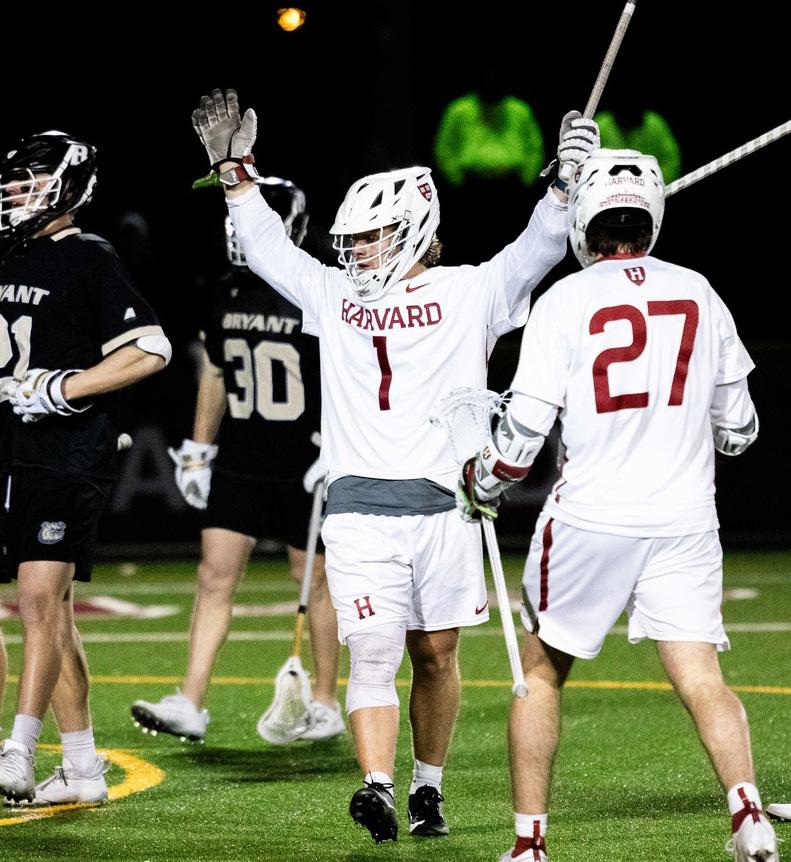

APRIL 12, 2024
HARVARD CRIMSON SPORTS 17 The squad will look to build on its success this weekend in a game against the University of Pennsylvania. DYLAN J. GOODMAN — CRIMSON PHOTOGRAPHER katharine.forst@thecrimson.com
THE


$10 off your next 10 meals Disclaimer: Terms apply. Offer expires 05/31/24. Taxes and fees still apply. Limited to $10 off next 10 orders, no minimum basket. Exclusions may apply. See app for details. ORDER NOW Use promo code: EATSCOLLEGE24

















































